
IN
PROGRESS,
PART II

At first, the fatal allusion did not seem to carry any effect beyond the ordinary. Pieter looked just like any other tow-haired Dutch boy, but then, at age six, he settled on his life career: photography. What? His parents could not fathom it, but despite them, photography obsessed him like a drug addiction from the earliest age when one fatal Christmas he received that harmless-looking, lego-toy kiddie camera from them. How they lived to regret that careless act!
It didn't help that there was a cultural bias. His parents thought their boy's penchant for photography a bit odd, since they were stock brokers, very prosperous ones too, in a long line of eminently respectable stock brokers. However, stocks and bonds and markets and futures bored Pieter to tears--he wanted nothing to do with stockbrokerage--which was tantamount to sin in their eyes.
Like a boozer and his bottle, that toylike camera could not be parted from him night nor day. He graduated to bigger and finer and more expensive specimens, of course, all the while honing his skills, which handily won him entrance and a top drawer scholarship at the best photography institutes of Paris and New York. After finishing with masters program (submitting one black and white photograph of his own choice), he quickly sallied forth as a free lance, taking assignments from various magazines.
One assignment particularly intrigued him and frightened his parents. After his friends weighed in against it, he felt impelled to take it, and stepped off the plane with his gear in Panama City, Panama, proud that he hadn't given in to people's silly fears for his safety.
Not wanting to interrupt his work, he thought that if he just went on working and ignored them, they'd fade away as unobtrusively as they appeared. How wrong he was about that! They just crowded in closer and closer until they were rubbing up next to him! Naked except for a loin cloth, each man was topped with strange headgear, and carried a spear in one hand and something else in the other hand he couldn't possibly identify--and, if this wasn't enough strangeness, they didn't speak, or if they did speak, it was by means of squeaks and rapid clicks of the tongue.
Strange as they appeared and acted, Pieter still wasn't afraid in the least these native people, just curious.
He noticed some other things about them. They had mutilated their noses to look like bats, he thought, but why go to that trouble? Were they bat-god worshippers?
He wanted to photograph them of course, to add to his pictures of the new hummingbird species for the magazine that had sent him to Panama, but his visitors rudely grabbed him. He found out immediately how extremely strong they were. He couldn't do a thing to resist them, they handled him like a doll with their massive, iron-hard muscles. They threw down his world-class camera and tripod despite his protests, and...kidnapped him!
Yes, he told himself, it was a genuine kidnapping, no question about it. He was somebody's captive. What was he to do now? He thought hard. He knew he had his rights--and they were breaking international law, and could be brought before a court, since he was a Dutch citizen. But what language did they speak? It seems an utterly nonsensical language he would never be able to alphabetize!
They gave him no time to talk his way out even if he could have mastered their gibberish-type language, or, failing that, to bribe them with something--money or a watch or a ring he wore.
Squeaking and clicking with calculator-like speed, they manhandled him head to foot as they hustled him through the jungle up and down steep slopes, and finally threw him into a small bamboo enclosure.
There they left him. For hours and hours, his hands tied behind him, he had time--but time for what? Everything of his former life had been taken from him by force. Now he had all the time in the world to study bamboo, ants of all kinds and sizes, poisonous centipedes, and how a man in his position sweated and felt other signs of discomfort.
As for ants, the whites ate holes in his clothes, while the red headed white ants burned him like fire when they bit him. The blacks attacked the white ants and left him alone. The tiniest ants were ferocious, and burrowed into his flesh with forceps-like mandibles that caused him great pain wherever they fastened on to him. He was constantly trying to shake them off him, or out of his shirt and pants, and he couldn't keep them out, as the white ants ate holes they could easily slip through.
But this, interesting to someone else maybe, was not at all what he had signed up for, not what he was trained to do, and he was becoming more and more upset and impatient and restless.

Over the hours, he worked frantically to free his hands, but they had tied him expertly with braided bamboo fibers, and he couldn't break them. Yet with enough work and the grease of his own sweat glands he managed to free one hand, and then he carefully moved aside one bamboo stake just enough so he could take a peek at his captors.
Whew! What ugly brutes they were when seen in repose! It was better when they were moving about. But now he could examine every horrible detail! Then he saw the bone litter around them. A horrible feeling swept over him. Were they actually going to COOK and INGEST him? Would their teeth masticulate him and his body tissues actually slide down their throats, swallowed, and enter their stomachs?
Why not? He had heard how there were many cannibals still in the wild regions of the tropics in tropical Australasia, so why not here in western Panama?
The possibility made him sweat, all the more he considered it. Why hadn't anyone warned him about these wild, unwashed, utterly uncivilized tribes of western Panama? It was hepatitus from impure water, and malarial mosquitoes, typhoid and parasites and jaguars, not to mention sharks and poisonous jellyfish and snakes that his friends warned him about--not the natives! After all, the natives were reputed to be pure, uncontaminated, noble souls--all living in perfect accord with nature and the eternal cycles of life and regeneration.
The filthy scoundrels! They had first taken all his gear away, then, worse, stripped him of his cell so he couldn't call out for help. He was at the mercy of these clicking, squeaking devils! Evidently, they had no regard for the authorities, human rights, and the Oslo Accords. If this was native culture, he wanted nothing more to do with any of it!


Why waste the carcass, Pieter wondered, then he remembered reading something about native cuisine, how certain rodents were rendered inedible due to poisonous oil glands. Evidently, this was the toxic type they were gourmandizing on. Too bad they knew the difference! he thought uncharitably.
One of the brutes then did something even more nasty. He relieved himself, right into the fire, and liberally sprayed the pot too, as the steam rose up and enfolded his companions!
Yet his unhygenic act didn't turn the edge of their appetites any, it seemed. His companions smacked their lips and wriggled their mutilated noses as the mighty hunter who shot the rodent stirred the mess in the pot with the rudely carved ladle--but only after he had wiped his nose with it!
Did these fiends know nothing about Dutch cleanliness? Their cook took the paddle spoon out from time to time, licking it with their thick, agile, dog-like tongues, then gave the others a lick or two in turn, before he stuck it back in the to stir again.
Acrid smoke of burning green wood sprayed with urine and a stench of stewing flesh and guts and burnt hair wafted over him--it couldn't be kept out of his bamboo enclosure, and he couldn't cover his nose with his hands.
St. Ursula! he groaned. Was he going to end up in that same pot with that awful rat and all those filthy guts? It was one thing being multicultural and diversity-minded in a clean, scentless, civilized setting, but here? Everything he had been taught since he was first able to go to school was now being challenged by these naked ruffians with the odd noses and outlandish headgear!

She had been going about her business, photographing the glyphs of the latest discovered Mayan ruins of Zatpotecacoatl when a gang of Indians (what tribe she couldn't guess at the moment), sprang out of the bushes upon her, and everything she had been doing was spoiled--as all her gear and film had been left behind, to get wet and ruined, no doubt, in the next tropical downpour!
It was all their fault! Whoever they were, she would see to it they were punished as soon as the authorities came and set her free!
She struggled to get free, nevertheless, from her bamboo bonds, just the same, as it was hard to tell when the police would come--though surely, they would come to inquire about her welfare--since she had taken the precaution to instruct her hotelier that should she not return by a certain date, he was to alert the authorities immediately and hand over a map she had made for them giving her exact coordinates.
A young woman, operating free lance (not by choice, as two porters and a cook had run off, taking a canoe with most of her provisions after only two days, crying some nonsense about "bat people"), had to be careful to make such arrangements, she knew. She had determined back at the university when receiving her degree, she wasn't going to end up just another "young, promising" researcher "missing in action," reported for a few days on the news, then forgotten.
But now, as the minutes stretched into hours, and the heat and bugs and her cramping arms and wrists took a toll on her patience and stamina, her assurance of rescue began to wane as well.
She realized that if anyone was to help her, it had to be herself, or nobody.
She listened to their strange, rapidfire clicking-squeaking speech of the Indians squatting round a fire only feet away from her, the constant smacking of their lips, the other rude sounds they made too regardless of a female's presence, and wondered how long she could endure their odious company without screaming?
Funny, she thought, she hadn't thought of screaming before. It wasn't encouraged in civilized society, true; even in self-defense, hardly was it mentioned. But why not do it? Maybe it would draw her rescuers, she thought. They were evidently having trouble finding her in the terrific rain forest undergrowth, after being hauled off from her work camp set in the tomb of a Mayan noble or prince an earthquake had fortuitously opened to view.
She estimated she couldn't be more than a couple miles off that map she had made, for they didn't take very long to stop and make camp, but the jungle was so thick and claustrophic, whole Mayan cities once containing tens of thousands of inhabitants had been swallowed up in it, and were invisible even to low flying aircraft. So how was she going to be spotted, if she couldn't be seen? No, she had to be heard first, and that meant using basic equipment, her vocal chords, which, fortunately, were still in great shape.
Wendy drew in her breath, and...
Only five or six feet away in another bamboo enclosure, Pieter's pity party came to an abrupt halt as he heard the most horrendous, earsplitting scream he could not have imagined ever coming from a human being--or was it human? Maybe it was a howler monkey? He could not tell at the moment.
The infernal, heart-stopping, blood-curdling scream finally ended, then it sounded again, only louder, shriller, if possible.
At the first scream, there was a a deathly hush in the Indian camp. After the second, he heard sounds of scrambling and scuffling around, as the Indians evidently panicked and ran this way and that to escape. Peering out between the bamboo stakes, he saw the camp was deserted entirely, the bubbling stew left to boil and burn up in the pot if his captors didn't come back soon.
But it wasn't the stew burning up that worried him. He realized, with a terrible feeling, that his ticket back to civilization had just been ripped up! These noxious, evil, nasty bat-people knew where they had found him, only they knew, and he had to find them, or he would wander in the jungles, and perish. Fancy that! His survival depended on the very ones who were most likely to make stew or shish kebab of him!
But there was nothing for it! He had to find them before they vanished forever beyond his reach!
He could use his hands, so he scrambled to free himself of his bamboo cell, but yet another scream emanating from the adjoining enclosure stopped him from leaving. He turned back, pulling aside the bamboos, and his eyes met an indignant female's.
Startled, he sprang back. Then he recovered his senses,and called out, "Hey, who are you? I thought I was the only captive here. What's your name!"
The response to that was a series of unladylike expletives that burned Pieter's ears. Then more civil words followed:
"Hey yourself! Now get me out of here!" the young woman yelled.
Pieter could tell this unknown female was serious. He was soon at her side, helping her get free of the handcuff, and she stood up, rubbing her wrists.
Now what? he wondered, as he watched her.
What was he going to do with the likes of ? He needed to do only one thing: to run and try to catch the bat-people! This young lady was definitely a complication. He had to get rid of her somehow, but how? He wasn't usually so impolite to the opposite sex, as to just run off and leave them in the howling jungle without a word first of rational explanation.
But how could he explain it best to her and not get more screams in response?
"Well, I'm Pieter van Pann," as she stood and glared at him. He went on. "But I really must go now, you see. You are free to go too-- so maybe this is the last we will see of you, but...er, the fellows who kidnapped me--and you too it seems--are the only ones who know the way out, or at least where they found me. From there I can make it out myself, I think. Here, it is hopeless! You understand that, of course?
That I really must go--"
"What are you saying? You'd leave me here like this? Alone? How could you ever find me again? But then you inferred you wouldn't even be trying, it was just yourself that mattered to you. I understand perfectly these Latins are all products of a macho society, but you--really, truly, you're an absolute beast in my opinion to even consider doing a thing like that! Leave me to rot in this stinking armpit of Panana? Just try it! You're not going anywhere, unless we go together!"
Pieter was overwhelmed. He hadn't really meant to give her that impression, that he cared only for his own safety. What an appalling inference! He wouldn't just let her "rot," as she said. If only she could see his point he had tried to make. He just wasn't accustomed to taking female companions on his expeditions-- being free lance and all.
Once again he tried to explain this, but got nowhere, and soon stuttered to a halt, as they started panting with frustration (Pieter) and anger and female outrage (Linda) at each other.
Civilized discourse had failed both of them. She grew even more angry as he attempted to talk in more diplomatic terms, and got out a wretched account of the way he preferred to work in the field--which was uncomplicated and solo, of course.


If once he detected anything and suspicioned a guard,
he had him tortured until he confessed, then he was put to death. The same was done to any accomplices he named, all done quietly without trials deep in the palace dungeons. His spies were everywhere too, watching places where he was not physically able to be present, and they reported to him any irregularity. He kept voluminous files, but they were not written down--oh no, he trusted no one with state secrets--no, they were all in his head. Besides, fear was
the best weapon he held in his hand, he found from long experience. Maybe it was theft, or
seduction, or even murder and assassination.
If anyone was up to something,
the very thought of Popilius and his gimlet eye finding him out could stop that one from trying it. Then again, a little sorcery never hurt anyone's power base, he had found early on in his job. Popilius purposely cultivated his reputation of an Egyptian seer,
of his being able to see through walls and hear every word spoken and discern a man's secret thoughts.
His Egyptian roots served him well. Both his superiors and inferiors reckoned him
a great sorcerer just because he came from Alexandrea, that prolific breeder of thousands such.
He let it be known, in fact, that a great serpent, a sacred cobra, had nursed him in
a temple, after his mother offered him to the god. From his adoptive serpent mother, he had
learnt the arts of wisdoms and sorcery, and the
art of select poisons as well. Actually, the truth was far different and not uncommon. He had been a slave to a childless, elderly Jewish banker, and done so well as a youth
in his master's business that
before he died, the old man wrote his will and adopted him as a son and heir and freed him with a considerable fortune to make his way on or establish a trade or business of his own. Seeing that Alexandrea was
too full of bankers, he looked abroad to Roma! Once his
adoptive father honorably interred in a sumptuous pink and gold-veined alabaster tomb, Popilius had taken ship immediately for Roma, the greatest city of opportunity in the world for enterprising freedmen like himself with some capital to invest.
Arrived in Roma, Popilius Serapius wasted no time. Getting into the good graces of aristocrats and senators through special services, bribes, and expert banking advice,
he was soon hired by Nero's palace chancellor. Cupronius Specius Erattus, a thoroughly lazy nobleman used to having servants do
everything for him, the fellow despised anything so menial as handling books and accounts,
servants and kitchens and estates, so his assistant Popilius was put immediately to work to supervise the imperial domains and palaces. Erattus held the official title while Popilius Serapius did the actual work in the shadows. He didn't mind the worthless Erattus received Nero's accolades for his fine work, so long as he held the real power. Without exciting envy by
being conspicuous, Popilius continued in power after Erattus choked on an overstuffed dormouse and
had to be replaced with another Lord Chancellor. Erratus's successor soon found that Popilius
Serapius was irreplaceable, and his successor too found the same thing to be true, so that
Popilius continued emperor to emperor. He gained so much knowledge of the workings of
the palace machinery and wielded so much power, finally no one could rival or supplant him, he
was just too efficient and, just as important, knew too much for anyone to dare unhorse him.
He moved about with difficulty, however, so he seldom walked anywhere on his own two feet. Even in the palaces, in his own private rooms, he never took a step,
as it wasn't necessary.
A litter with eight litter-bearers, each muscled like a gladiator, transported him from room to room, hall to hall, wherever he went to inspect and direct how things should go.
Another thing he supervised was the daily schedule of guests and visitors. Important as they might be, as a
shrewd master of protocol, he had a final say about them, whether they gained entrance and exactly how long he allowed them to be on the premises. A key man like himself, with that much power and girth, was someone to reckon with! Nobody got around Popilius! He had
been in charge since early on, from Nero's earliers days onwards, and he wasn't about to retire, though he was showing signs of age and slowing down a bit. His one vanity, his hair! What hair remained to him was reddened with henna from imperial farms in the province of Asia. A special ship brought it in to Ostia, then it was carried by his own porters directly to his quarters, as he risked nothing to insure his henna
was of the highest quality without a single chance of adulteration in the common markets. This way he also
insured no rival or enemy slipped in something poisonous too--always something to keep in mind in
a palace society of poison experts.
As his hairdresser, an expert Greek, applied the henna freshly to his newly washed white hair,
no one else was permitted to be present. Kohl was also applied to his
eyelashes and brows, and powdered rouge to his cheeks, to keep his color up,
though additional color was not necessary, his Egyptian skin had
retained its color well enough after long years under a northern sun.
Given a mirror, Popilius studied his hair and face carefully. He
demanded some more rouge, and a little more henna for his
hair, then decided it was enough, and dropped the mirror.
He clapped his hands, and chair attendants,
admitted by guards, rushed into the room and bowed low, waiting.
"Wine," he said.
A bottle was rushed in to him, covered with a fine white
linen.
Water too was offered, to mix it in a cup.
When the glass was handed him, Popilius studied it for a moment,
smiled, then ordered the servant to drink it himself.
The servant obeyed and drank. When the servant did not drop and writhe on the floor,
only then did Popilius order a glass for himself poured from the same bottle.
After that, the bottle was no good, as it couldn't be given to anyone else to finish, and it was taken away
to be smashed, as Popilius never drank from the same bottle twice,
and he permitted none of his servants to drink his wine either--
being a scourge of drunkenness among the palace staff.
A spy came and was admitted, showing himself
first to the guards, who then attended him
into the presence of Popilius.
Popilius waved his attendants and servants
away, then listened to the spy's
bit of information.
Popilius's kohl-darkened brows lifted.
He clapped his hands,
and the attendants approached.
"Take me to the emperor, at once!"Unquestionably, Popilius Serapis was the chief authority (behind the scenes) in the governance of the Imperial palaces.
Indispensable, no emperor could think to do without him, for he kept everything moving efficiently
as if on a thousand well-oiled little wheels and levers. He also controlled the maintenance of the grounds, stables, carriage houses, estates, factories, ranches, and
villas strung out all over Italia, Sicilia, Gaulia, Corsica and Sardinia--everything the currently reigning emperor possessed.
He also oversaw the staffing, which mean he was life or death to thousands, slaves or freedmen. Soldiers and guards too bore his watchful, beady eye--as he knew all about how they were most likely to harbor an assassin
against the emperor.




Growing up in the shadow of a smoking mountain was never a serious concern to him as a boy. Earth-shattering quakes were another matter. Yes, he had heard of a great shaking six years before he was born, that wrecked hundreds of buildings and houses, great and small, in his city, but most all that damage had been repaired and new and even larger buildings were built to replace what had been damaged. His teacher had read him the philosopher Seneca's own account of the quake, and Seneca was the teacher to the Emperor Nero! No wonder Roma had taken notice of it. Not only Pompeii, but his own home had been knocked mostly flat. His father, Cassius Ancus Semptimius, with a large business in garum, fish sauce for which the city was famous, was not ruined by the loss of the old Samnite structure. With his saved capital reserves he set out to make everything much bigger and better. He had supervised the complete rebuilding of the house from its foundations, while enlarging it considerably by taking over two older houses, leveling them, then building on their foundations.
Their house now promised to be one of Pompeii's most luxurious and biggest. But, of course, their residence was modest in comparison the Great House he had seen, one of the most luxurious, able to rival even the best houses in Roma.

After his Greek pedagogue, Hymenaeus, was finished teaching him and went to his quarters several blocks away, Tully ran to the work in progress and had fun talking to common workmen and hearing their crude stories--he thought little about the cause of their being there.
One painter painted some hairy satyrs--lusting, goat-like men fondling naked nymphs--and his father saw it and had him paint over it with flowers and fruit baskets, olive wreathes and such innocent trifles. Tully had been in other houses and seen these wicked, hairy satyrs, so why couldn't his home have them too?
He didn't dare ask his father, so he asked his mother. "You're not old enough to look at such beasts and their naughty antics," she replied, though he was nine at the time and thought himself old enough. "You must wait a bit more, and then your father will tell you what that is about."
Well, he didn't wait! He ran first thing and asked the workmen. They told him everything! One even drew what he was talking about, which made Tully's eyes widen and his mouth hang open. He was astounded. That is what men did to both women and sometimes even other men? His father came back in just then, saw what was going on, called the house guards and had the workmen thrown out, with their tools thrown in the street with them.
At that moment a friend of his father's, Nathan bar-Shlomo came calling, saw the disturbance, and Tully creeping behind the pillars heard his father explain what the men had done, inflaming his young son's tender ears with their lewd orgies with prostitutes.
His father's friend made a comment that Tully never forgot, though he didn't understand it. "They are but ignorant men, they are slaves to their base desires. After all, this city is just another Sodom or Gomorrah."
"Yes, it certainly is, thanks to the Romans!" his father agreed. "Ever since the Romans came, this city has never been the same! But not here, not in my house! We Samnites still believe in virtue and noble, clean living. That is what made us strong and resolute men, able to endure life's troubles and hardships."
"You are a good man among your people, and a good father, Cassius Septimius," the friend declared. "You will always have my business, even if my God is not yet yours, and you still throw incense to your vain Greek and Roman idols, and even the Emperor Vespasianus as a god, though he is a mere mortal of flesh and blood like us!"
"Be careful, dear friend!" his father cautioned. "You are free to speak your mind and religion in my own house, but the Emperor may have a spy nearby listening to us, and throw us both in the arena with lions and leopards like they are doing the followers of Christus in Roma and other places up in Gaulia, I hear! And if you should ever persuade me to give up my gods for your one nvisible Jewish God, why I would lose all my business in a day--since you Jews are too few in this city to keep my business prosperous!"
Whatever was said after that, Tully did not stick around to hear, for they were coming his way, and he had to run quick, or be caught eaves-dropping. He was frightened now. After the affair with the naughty painters, to be caught listening from behind the pillars to grown-ups, he feared his father would severely discipline him. He ran to his mother's room and pretended nothing had happened. After a while, he went to his own room. He climbed up into his window and sat gazing out at the chief sight, Vesuvius Mons.

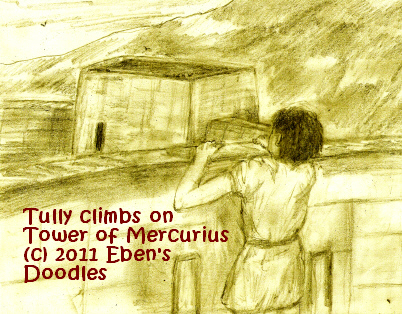
There they had a close view of the gladiators as they fought and trained, and sometimes seriously wounded each other. For that reason, his father would never take him there, thinking him too young to see bloodshed and other things that went on there among the rough, hard-drinking, carousing and womanizing men in the school.

His father was talking to his friend, and only later did Tully see him when they had dinner, which was set up on the terrace in a garden, the triclinium for dining outdoors. The subject of what happened to the workmen did not come up, fortunately for Tully. He hardly knew what he was eating, wondering all the time what his father might say. Strangely, his father never breathed a word about it, nor the part he had played.
Instead, his parents discussed something else. "I'm sorry your dear friend is not here to dine in our new triclinium," his mother said. "Didn't you invite him, Cassius? It would be impolite for him to turn down our invitation."
His father shrugged. "But you forget something important, dear, which they, being Jews of strict religion never forget."
"What is that?"
"They cannot eat our foods prepared as we normally prepare them. Meats and dairy foods must be handled and cooked separately. They use entirely different sets of utensils, that they use to prepare and cook with. Even the garum sauce we use and sell, they cannot use. So we make a special garum in the port factory without using unscaled fish. For the Jewish customers we have, only scaled fish will do in the sauce. I thought you knew that. We would have to prepare and cook their way, separating meats and dairy foods, using separate sets of utensils, pots, and dishes. They cannot even be washed and rinsed in the same scullery tub, nor can the same towel be used to dry both sets."
"Yes, I think I heard some of this before from you," his mother replied wearily, "but I never understood it, so I forgot it. I also recall you said they never eat pork. How can you have a tasty dinner dish without some pork?"
"Well, the Jews are very strict about their dietary laws, which they believe their single, invisible God, whom they decline to name out of reverence, commanded them to follow, but they are good people for all that, and I don't believe they mean any effront to us. My friend and good customer, Moshe bar-Shlomo, who always pays on time, isn't at all anti-Roman or a hater of our ancient Samnite customs, as some people say who would give them all a bad name--the Jews, I mean.
I could trust him in my home at any hour, day or night. I can't say that about most people we know! Even our families and blood relatives--I wouldn't allow them free run here!"
Then they changed the subject to something about the layout of a new garden and its decorations.
What a relief that was! Yet he never forgot that "Sodom and Gomorrah". Were they cities? The names were strange and foreign. They didn't sound like good places to be. What had happened to them? It was a mystery to him, and he didn't dare ask his parents. He had kept quiet and escaped a whipping, hadn't he? As his teacher said in Greek, "Don't ever tempt the gods, boy. If you do, they will crush you like my shoe heel crushes a bug!"
That was good enough advice for him! And another thing his pedagogue said: "Best leave sleeping dogs lie."
So too with the quake that destroyed their house six years before he was born. His parents did not speak of it, so he never really thought about the cause or connected it to the big mountain a few miles to the east of the city. His pedagogue, taking him outside the walls to teach him names of wild plants, herbs, trees, and even rocks that Aristotelius had written about, noticed something and pointed it out to him--the city was perched on what had once been a swarming mass of melted rock.
"But where did it come from, Teacher?" he asked.
His teacher pointed to the north, toward the mountain, Vesuvius Mons!
Tully couldn't believe it. "How could it melt rock and spit it out like the Sarno all the way here? What would melt the rock, Teacher?"
"If I take you to the goldsmith or any other smithy, he can show you that fire, when it is blown hot enough by the bellows, can melt rock, until you can pour it like water!"
Tully was dumbfounded. He looked again at the mountain. "But I see no fire on it. No rock is being melted there."
"Oh, but just wait! It may awaken and start a fire and melt rock again. Other mountains, one far south of here, Etna Mons is smoking and burning all the time. It is presently melting rock. Sometimes these mountains fall asleep, sleep for a time, then wake up and suddenly spew fire, smoke, and melted rock."
"Not our Vesuvius Mons!" Tully replied to himself. "It's always been sleeping like a lazy, old dog since I was born. It's not going to wake up for a long, long time yet! But I wish it would, I'd love to watch it melt rock and do those other things you say they can do!"
"Silly boy!" the teacher said, shaking his head as he left Tully. "It would bring the death of all of us and this city too!"
Tully soon forgot about his teacher's ominous words. Life wasn't that serious! Pompeii had everything a boy could want--and much more! It was always changing, being built in all the time since the last earth shaking. It was again a wonderful city. Theaters, gymnasium, gladiator school, huge swimming pools, arena, forums, markets of all kinds, grand temples, which were thronged with people from the cities all around and even from far parts of the world. He had learned several languages already, among the many he heard spoken by visitors.
With all this to interest and entertain him and his friends, why should he worry about the clouded mountain towering in the near distance? It had always looked that way since the day he first saw it--and hadn't changed, nor had it ever hurt anyone he knew.
He had climbed the lower slopes with friends too, and there was nothing dangerous about it, other than maybe some snakes and wild dogs. Much was covered with trees and plants, it was nice up on it. The bare, sharp-edged rocks and black, cinder-strewn slopes above the trees were harder going, of course, and the wind whipped at you, and it could get cold. Cliffs too--but they didn't venture to climb them, though some older boys claimed they already had done it and even bragged about how they had made it to the very top--though he didn't believe them. Someday, he vowed, when he was a year or two older, he would really do it! He just turned eleven, so he knew he would grow a lot soon and be a big, strong boy, able to reach the very top, where the eagles soared.
Tully was tremendously excited. It was like a holiday, only better than the ones for honoring various gods and the emperor, since his father was introducing him to his business affairs, just as if he were a grown-up! This was just as good as watching the gladiators train. which was strictly forbidden by law of course--but boys can always find peep holes to watch things that would shock even adults.
He already knew the businesses of the tradesmen that rented rooms where their house fronted busy intersections of streets--the shop that sold hot foods, and the tavern, and the taberna, and how they didn't want their landlord's son hanging around.
First, his father took him to a number of his garum customers, right into their splendid houses that were normally closed to anyone but select friends, family, and household servants.

"Whose baby was it?" Cassius S. asked his son. Tully had no idea. "Well, the king devised a sure test to reveal the true mother." "How, pater?" "He simply ordered a guard standing there to divide the child with his sword and give half to each. Immediately, as the wise king foresaw, the true mother was revealed, when she fell down in tears before the king and pleaded strenously for the child to be given to the other claimant, despite the fact she had approved the division of the child, since the king wasn't going to award her the whole child.
"No true mother would hesitate to give her child up to save him," Cassius instructed his son, to drive the point home. "I suppose so," said Tully. "But what happened to the other woman, the one who lied?" "What would you think happened? She stole her friend's baby, then lied before a king to keep him. She committed two crimes at the least, even showing contempt to her king the judge by seeking to deceive him. Of course, he ordered her to be severely punished."
Aaron's father entered the atrium with Aaron at that moment, catching Cassius's last words. "Ah, I see you are showing our great wise king and the testing of the two mothers to your son! He should profit by it."
"I am not sure he is yet old enough," Cassius replied doubtfully eyeing his son. "But I know I have profited. Your king proved himself the wisest man on earth. If only we had emperors as wise as this Solomon of yours! I find them nothing but fools and shameless beasts!"
Natan bar-Shlomo cleared his throat. "May I caution you in turn, friend Cassius, for that is daring talk even for you, a nobleman among the Samnites. If I, a mere Jew, were to say the same thing, and it was reported, I might find myself in deep trouble even though I spoke it in my own house!"
Cassius nodded. "By Jove, I will not mention the misbegotten emperors of Roma again for your sake. And please forgive me. I just misspoke, naming my god within your own walls."
Aaron's father inclined his head, accepting the apology.
All this was boring, political talk for young boys. "Could Aaron go with them?" Tully asked his father the moment the talk lapsed. Aaron was his best friend, he added.
His father consulted Aaron's father first. His wife came to greet them at this time, and so she entered into the matter. Since this was a special outing, and they felt they could trust their son with their friend Cassius Septimius, they approved it.
"He will learn something important about business," Aaron's father remarked, smiling. They escorted Cassius Septimius and the two boys to the delivery wagon, and the driver took them to the next customer, the House of the Vetii
It wasn't large like other houses of wealthy people, but the two merchants, Aulus Vettius Restitutus and Aulus Vettius Conviva, had spent huge sums to decorate it with wall paintings, statues, fountains and pools.
It was like a wonderland, a picture-gallery of all the best heroes of Graecia and Roma and their exploits.
But, strangely, Tully's father wouldn't let them look at certain paintings in the entrance hall which featured Priapus, the god of fertility himself, but everything else in the public rooms were allowed them to view while Aulus Restitutus conversed with Cassius Septimius.
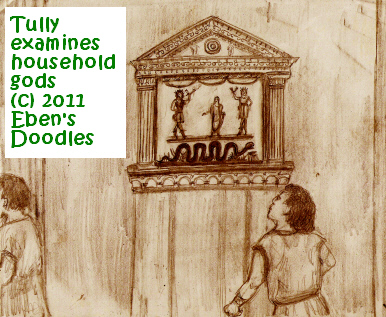



"I can't look, it's an abomination, it's Sodom and Gomorrah in there!" Aaron blurted out. "I'll be defiled!"
Cassius S. then saw the wall-paintings, then glanced back at his son and little friend who was so upset.
"Son, you know better than to look at such things! They're not for children. I shall deal with you later."
He turned to Aulus R. "My son has misbehaved, so we are leaving now. I regret this happened. I thought they were old enough to accompany me--"
Aulus R. laughed. "I forgot to tell you this room was repainted last week, that's all it is. Don't hold it against the boys, Septimius! Lighten up! Boys will be boys. They won't see anything else that will offend your propriety. I beg your pardon for the naughty little bacchantes of this room if they offended you, but I got so tired of the floral wreaths and little birds, I told the painters to do as they wished with it, just so it was amusing to look at, and not so dull."
"Yes, I see they did as they wished!" Cassius Septimius observed wryly. "Just the same, I think it is time we were going. Good earnings, Aulus Restitutus!"
Back at the wagon, Cassius S. turned to Aaron. "Run along home now," he said. "Can you find your way, Aaron?"
"Yes, sir! I can!"
Aaron scampered off, leaving his glum-faced friend to his fate.
"You come with me," the father said to the son.
"You've shamed me before my patron and also the son of my friend the Jew!"
Cassius S. led him into a small open-doored warehouse, and found a notched measuring stick for the sacks of wheat and other grains.
They emerged a little later from the warehouse, Tully's face red and streaked with tears.
"Now will you behave, or must I send you home?"
"I'll behave, Pater! Please let me go with you! Don't send me home!"
Cassius observed the tears, and shook his head. "Your tears will not move me as they do your mother, but I will give you another chance. Just don't treat it lightly!"
They continued to the Forum, and the wagon, now empty of long-necked garum sauce jars, was sent home with the drayer.



In the heart of Pompeii the main Forum was bordered by the city's chief temples, halls of civil government and municipal offices, and halls of the major industries and trades. They had just started from the huge open court and turned into the Basilica, Ero passing overhead at that moment, when they were hailed by Nathan Bar-Sholomo, Aaron's father!

What would Aaron's father say? Aaron must have told him everything, Tully thought, and now...
He would have liked to run, but he couldn't--his father held his hand fast.
With his head down, filled with dread, he waited for Aaron's father to tell his own father what Aaron had said. Wouldn't Aaron make it worse than it was? And wouldn't he get whipped again when they got home? But Aaron's father started talking business.
Tully waited, hardly able to breathe, but still not one word about him.
Finally, his father gave his hand to Aaron's father to shake on their joining in a new business venture.
"I will be happy to join you and finance half the cost. You talked to the right official. How did you get close to him enough to receive your offer. Imagine that, we'll be supplying the garum sauce to the officers of four legions! The gods of fortune have smiled on us and our houses this day!"
"No, not the gods, my friend, there is only one true God. He is the one who smiled on us, and gave me entrance in the Capitol to the high official I needed to see, who had the power to give that contract, and then decided I was the man for it. My Roman name, Cavus Marcus Porticus, works well in Roma!"
"Yes, I know, you call your god of the Jews, strangely enough, the 'God of Abraham'--He is the one who favors you and blesses you and gives you such a sharp ear and eye for business."
"It is the truth, you know it is the truth, Cassius. You should have been there, seen Pompilius's vestibule and atrium packed with the most important men of business, all seeking what I alone walked away with! Our holy scriptures say, 'God promised Abraham our forefather, I will make you into a great nation...I will bless those who bless you, and whoever curses you I will curse; and all the peoples of the earth will be blessed through you.'"
Tully heard his father heave a deep sigh.
"Speak no more, friend, I am almost persuaded to become a believer in one God and worship your God! What sane man would not choose such blessing as you have on you over curses? But should we speak so openly of your God here? We might be overheard by an enemy of your people. I am Samnite, born of the most ancient aristocracy, and my people were civilized and city-bred, flourishing here for centuries before Sulla's legions put down our last resistance to Roma. Freedom was a nice thing, but we have been under Roma for a long time now and have grown accustomed to the Roman yoke on our necks and shoulders. You Jews refused to submit wisely as my Samnite forefathers did, so Roma destroyed your country, your temple, and enslaved your people by the hundreds of thousands--all those they didn't slaughter. Surely, Roma has a curse on her now for that, if your God is still the God you say he is."
"God never changes, if that is what you are asking! Oh, deep in your heart, you are a God-fearer, Cassius! Know that the One True God has his eye on you!"
Tully's father was edgy, and looked around. "But will he protect me as he protected your own people and country? Look how your own people the Jews were destroyed, and your temple burnt, leveled to the ground, and teams of oxen pulled plows over the cleared earth where your great holy city once stood. Why didn't your God deliver you from our legions, and the fury of Vespasianus and his son Titus? They were worse and more merciless than even Cornelius Sulla was to our city. He could have destroyed us, but refrained, reducing us to a colony but allowing some vestiges of local government here of our own. Is that what the blessing of the God of Abraham brings his people--total, merciless destruction?"
"No, my friend, that was punishment for transgressing his holy laws; but still his covenant with us holds fast, he will never forsake us utterly, he will bring us back to our own country, he will plant us there and make us flourish once again, as in the days of our greatest kings, David and Solomon his son."
"Ah, your great namesake, the wisest king on earth whose proverbs you gave me in a book, which I keep by my bedside. Thanks to him, I will not grow slack at discipline and spoil my son, like I see other fathers doing with their sons in this beautiful, rotten city of ours."
After a few more words, Nathan bar-Sholmo asked for a favor. "Certainly, what is it I can do for you!"
"My wife and I think so highly of you, Cassius. Here is the key to my house. We must leave and go to my father who lives in Stabia. Report has come he is fallen very ill and may not live long. I am leaving only our household servants. If we are gone more than a few days, would you go and look in, to see if things are in order? It would be a great relief to our minds if we could see to my father and not worry about our home."
"Of course, I am happy and most honored to render this service to you, good friend!" Cassius replied, taking the large brass key handed over to him and attaching it to his belt. "When will you be leaving for your father's home?"
"As soon as I found you and finished talking of our business! But now I am free to take my wife and son and go. I am anxious to be at father's side as soon as possible. As his eldest son, he depends upon me to handle his final affairs."
"I am so sorry to hear of his illness, and would pay for prayers for him at the temples of Jupiter and the others, but wouldn't offend you, so I will just commend him to your God's care, and not detain you a moment longer."
Exchanging the customary Pompeiian "Good earnings!" to each other, they parted, Aaron's father hurrying off to Tully's great relief, without one word about Tully's misbehavior in his son's company to disgrace him.
They proceeded toward the far end of the Basilica, toward the equestrian statue of Caesar Augustus that stood in front of the Tribunal where all the civil cases were handled.
"Son, I have to check on my petition to the emperor, son. Remember how I told you we lost most of our lands and vineyards, and businesses--the laundries, bakeries, laundries, dyeworks and cloth weaving, when Sulla took them? All we were left was our garum manufacture and the little shops round our house. Remember the great house I took you to, to see the big floor picture of Alexander the Great fighting Darius, king of Persia?"
"Yes, Pater! I liked it very much! May I see it again?"
"Well, perhaps. Anyway, that great house was built on our property with our lost fortune. Sulla is little thought of these days. We may get back some things back if the emperor approves my petition. Our family has tried for generations to get compensation, but we could never reach the emperor's attention, whoever the emperor was each time our family applied with a new petition and the necessary bribes. But our city has risen in imperial favor since then. Vespasianus has his temple here, and a villa on the mountain slope. The Governors erected an arch to Germanicus and numerous statues of the members of the imperial families adorn the public places. Noble Romans have their villas here, sparing no luxury on their embellishment. All this was bound to help us in my suit, son. We cannot be ignored as in former days when we Samnites were still considered conquered, inferior people by Romans. Samnites have come to occupy some of the highest positions. Who knows? Today we could even hear the disposition of the case."
Tully wasn't sure he understood all this adult talk, but he caught parts of it.
And Cassius Septimius was right, he was not to disappointed this auspicious day--this 24th of the month of Augustus. They had just climbed the finely made wooden stairs to go to the entrance doors when four men came out of the Tribunal. Cassius recognized two of the men as the city's duumvirs, the dual-serving Governors of Pompeii. The tallest of them, Governor Publius Lucanus Torenus spoke for his peer as well as the others, greeting Cassius with a beaming smile.

"Pater, you're hurting me!" Tully gasped, trying to twist his hand free.
Cassius realized he was gripping his son's hand like an iron vise, he was so overwhelmed by what the City Governor was declaring to him.
He let Tully go, so he could rub away the pain. "Pardon me, son, I can hardly believe this much good news--"
He turned back to the smiling Torenus.
"Excuse me, Governor, I am somewhat shaken by such good fortune falling so suddenly on me, I nearly crushed my son's poor fingers."
"Yes, I can understand why you might find this news gripping," quipped Torenus. "But now our other suits can go forward on the tail of your successful one. We may even be awarded self-government, and with freedom rise to become one of the greatest emporiums and port cities of the empire, as wealthy and great as Antioch or Alexandria or Athens and Ephesus. There will be no limit to our expansion and trade and industry. What was hard for us before this time in our inferior status imposed by the infamous Cornelius Sulla, will be made easy in the days to come. Your success is the golden key that opens the door to a glorious destiny for our city! What a day this is to celebrate, both in your home, Most Noble Cassius Septimius, and throughout the city. We Governors declare a holiday to be celebrated four days hence, so that preparations can be made beginning now. You, Cassius Septimius, will ride with us in state chariots through the Arch of Germanicus and receive the people's acclamation. In the Forum, at the Temple of Jupiter Capitolinus, you will lay a wreath of gilded laurel--"
After the officials were finished giving Cassius instructions and congratulations, the governor again urged him to do the honors at the amphitheatre's new opening, after a ban of the gladiatorials for ten years by Nero and the Senate due to a very bloody riot between the Pompeiians and the rival Nucerians that left many dead and wounded, including some important officials and their Roman guards.
Cassius respectfully declined. He had some urgent matters at home to attend to, he informed them.
"Oh, but you must come, Most Noble Cassius! You cannot miss seeing the Jewish candlestick we brought down from Roma. The Imperial Treasury and Archives released it to us just for this occasion. Other cities have asked, but they were all refused. What with the dancers and music, it will be a sensation, the like of which we may never see again!"
Bowing deeply, he declined a second time.
Keen disappointment showed in the officials' faces, but how could he help it? Cassius thought, his whole being sickened at the thought of what they were describing. Gladiatorial "Games" were distasteful to him, with the crowds screaming to see more and more blood shed for their entertainment. He could force himself to go, but to see the actual sacred candlestick of the Jewish temple defiled? No, it was out of the question--even if he lost his suit and favor with the emperor.
He would never forget his last visit to the amphitheatre nine years previously, how the city had staged an elaborate tribute to Vespasianus and Titus and their crushing of the rebel Jews of Judaea. A huge model of Jerusalem was constructed, the Temple of the Jewish god most prominent, then gladiators in Roman army uniforms fought Jewish rebels, other gladiators costumed in Jewish robes and beards. A lot of blood was shed in this mock battle, but that wasn't the worst of it. When the battle was over, and the "Jews" crushed and the city and temple set aflame, surviving Jews were strung up on long rows of crosses erected to form a giant Star of David. He and other prominent citizens all wearing laurel crowns of victory were then to form a mock-up of a triumphal procession and shout praises to Vespasianus and Titus for their great victories, waving banners while the tens of thousands in the stands celebrated. But that wasn't the whole story as it developed. Gladiators posing as Jews on the crosses were stripped naked of course. He had expected that. But when he saw he saw Pompeii's highest officials and chief citizens all joining in making the most vile, lewd fun with the naked, uncircumcised "Jews" on the crosses, it was so degrading a spectacle, he drew back. The crowded amphitheatre was roaring with laughter and could not get enough of watching their leaders make beasts of themselves. Yet the outrages of this paled in comparison with the centerpiece: a copy of the holiest object of the Jewish temple, the giant golden sacred candleladrum the Jews called the Menorah, was brought in by dancing naked women and satyr-lovers, and set on a stage. As the music of water organs and lutes played, the satyrs and the women danced around it, then copulated round the base of it. Satyrs copulated with satyrs too, to the vast delight of the crowds.
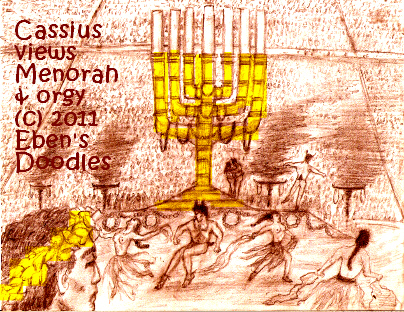
He recalled how he had run out of the amphitheatre, discarding his gilded laurel crown just beyond the gladiators' entrance where prostitutes plied their trade, inside and out of a nearby latrine.

How then could he explain his true reason--his utter disgust--for declining their invitation?
After expressing their disappointment and failing to induce him to go with them, the officials threw up their hands, shook their heads, and departed.
Cassius S. led Tully away with great relief, since he had stood his ground and not returned to the scene of such monumental horror.
Just the same, he felt somewhat weak and drained immediately afterwards, and a little afraid of the repercussions his refusal might entail to is business and social standing. He knew he couldn't deny the wishes of the governors and the high Roman official with impunity. No doubt they regarded his behavior as an effront to their dignity.
The temple of Vespasianus was nearest them. It was every Roman citizen's and subject's duty to honor the emperor's divinity and image, and Cassius Septimius was a good citizen of Roma, and hadn't the gods just now favored him in an extraordinary fashion as to restore his patrimony? Only had he not now risked the gods' displeasure, spurned their favor, by refusing to take part in the defilement of the Jewish temple's sacred candleladrum?
He paused, in the courtyard, and did not proceed to the altar where the priests waited on the temple's patrons to make donations and throw a pinch of incense as they recited their ritual prayers.
"Is the emperor really a god?" Tully asked candidly as a child would.
"The Senate declared him a god, son. It is our duty to honor him a god, and impious not to believe it."
"Yes, Pater," said Tully. "But Aaron doesn't believe he is a god, he told me so!"
"Don't you say another word! Just for that, we're leaving, and maybe the Genius of the divine emperor Vespasianus will send you a bad dream tonight or a bad stroke of fortune tomorrow!"
Yet his father wasn't really angry with him, for he took him next to the homes of some of Pompeii's wealthiest people. Servants let them in, knowing Cassius Septimius, even thoughWIDTH=500
most families were gone to the amphitheatre by this time.
In the finest house, Tully saw again his favorite, a magnificent mosaic of Alexander the Great on a horse chasing King Darius of the Persians in his chariot as their armies battled.
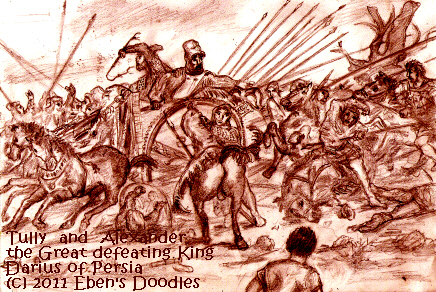

But worse, they came to an incident at the Arch of Germanicus, the mad, cruel "Little Boots," or Caligula.
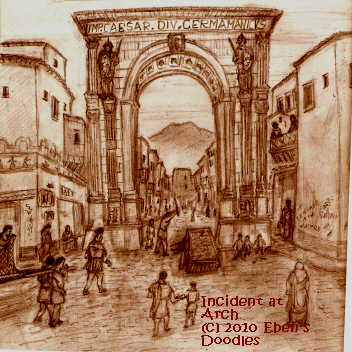
"But he won't pull the cart, officer!" the drayer protested. "He just wants to lie down and roll his eyes stupidly like that! I don't know what's got into him. Yesterday he was just fine!"
The disgusted officer flung the bloody stick away the drayer had used.
"Get your cart and your filthy beast out of here at once!" he ordered. "Kill him if you please, but not here! You're blocking the road and disturbing the peace!"
"I'll kill him all right, and cut him into little pieces if he doesn't get to his feet soon!" the drayer muttered as he went to the nearest taberna to hire some fellows to help him.
Tully pulled his father's sleeve.
"What's wrong with him, Pater?"
"I don't know, son--his eyes, he seems paralyzed with fear of something, though you would think he would be more afraid of his master's club!"
"It'll make good dog meat if nothing else!" observed one man, the proprieter of the nearby, very popular gambling house for rich, idle youth, whose sign featured two phalluses alongside a tall vase.
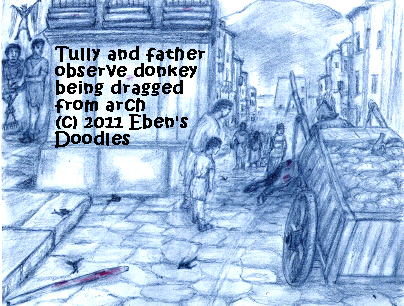
While this scene was playing out at the Arch honoring the bloody Caligula, eager, excited crowds already taking the best seats they could at the Amphitheatre for viewing the restarted gladitorials and--already the rumor was being noised abroad--the grand exhibiting of the Jewish Temple's menorah complete with bacchantes and nymphs.
"Go and see to Sulla," Cassius Septimius told his son, while he hurried off to see his wife, whom he knew must have grown concerned about the strange disturbances.
Tully found Sulla was seemingly turned mad, scratching his footpads bloody as he fought to get free.
Afraid to even touch the dog, he stayed clear back as the dog lunged against his metal collar, which cut into his neck and choked him. Whimpering and whining, the dog's eyes rolled back in their sockets. He had even bitten his own tongue, and bloody sputum drooled from Sulla's mouth.

"Pater! Pater!" he cried.
"What is it?" his father said, gripping his shoulders to calm him.
Tully couldn't know what to say. There's blood, blood all over him!" he blurted out.
His father's face went pale but very stern.
"Oh, do something, Septimius!" Tully's mother moaned. "I cannot take any more of this! The gods are punishing us, for daring to put them aside for that awful solitary god of the bar-Shlomo Jew! And I don't believe a word of it, that we are getting all that money from the Imperial Treasury. It's all foolishness. It'll never happen! Romans don't care about us Samnites getting justice!"
Cassius Septimius flung her a glance to silence her, then took his hands off his son, whose shoulders he was gripping too hard and hurting.
He turned to the door, with cold, ancient, aristocratic Samnite dignity in his bearing.
"You stay here with your mother, son, I'll deal with Sulla, and the horses too. It won't take long."
He went out, and Tully forgot his weeping mother and stayed by the door, waiting and listening anxiously.
Then he heard it, a sudden, shrieking, horrible yelp, like a dying animal in mortal agony would make.
His father did not return, so he crept out and retraced his steps.
What he found was Sulla lying in a heap, twitching, but his eyes closed. Then he saw the wound in his chest, pouring out blood, and a bloody sword, his father's, lying close by.
He hardly cared to do it, but he crept breathlessly to the stables. Peering round a corner he watched his father and the four stableboys lead out the snorting, stamping horses, one by one out the posticum and into the street.
"Take them to the fields and hobble them there!" his father ordered the men. "But make sure they have water. One of you stay. Calinus, stay and watch them, the rest of you return immediately. You, Cinnamon, on return, fetch the dog, for he is dead, and carry him in a grain sack and bury him someplace outside the wall. Take a shovel along too. You're broad of shoulder, you can manage it yourself. I'll look for another watchdog tomorrow. Clean up the dog's mess and wash all the stains. Do a good job! My wife is not to see anything if she goes back there--"
Tully didn't dare listen to more, he ran to his own room and hid in his bedclothes of his couch, his heart thumping. What had happened to cause all this turmoil? In less than an hour the whole household was turned upside down, and the city too seemed rocked all out of joint and its normal course of life!
The next day dawned like any other, the bright sun pouring in on the peristyles and the gardens and through the roof opening to the atrium. He could see the sun coming in his window, and knew it was time to get up.
He rose and washed his face in a basin a servant placed just inside the door, and used the towel to dry, and then he went to see if the cook had something. His parents rose later in the morning, usually. He was passing by their chamber when he heard voices, so he knew they were up--which was strange. He paused to listen, and heard his father speaking, with his mother interrupting him now and then. It sounded so serious to him, not like their usual conversations.
What were they planning? he thought, growing concerned. Were they going to move from Pompeii? The thought was horrible. Leave his wonderful city, which he liked so much? He knew there was none better in Italia. Even the thought of Roma did not appeal to him! Pompeii was perfect for a boy like him! He knew it, and loved his city. The thought of having to leave it for some villa elsewhere horrified him. Leave his friends and pastimes all behind? Surely, they wouldn't do this to him!
He was moving away when his father burst out the door, turning toward Tully's room. But he saw Tully and took his arm,
"You're just in time, son. Come in! Your mother and I have something for you to do."
Tully's heart sank. His feet dragging, he let his father lead him into the bedchamber. There he saw his mother lying on a couch in the shade of the room, her eyes dark with tears. Her hair wasn't arranged like it usually was--no servant had been called to do it in the fine coils she piled up on her head.
"Son, it is time to inform you of some things, important things.
As you know, there have been some things going on in this house that
seem most strange to me, to you no doubt, and to the servants as well.
They cannot be explained. It is not true the gods are against us, for
if there are no gods how--"
Tully's mother cried out, "How can you speak so to your son,
husband? That is impious talk!"
His father shot his mother a glance, then firmed his jaw, and continued.
"Anyway, the gods of Olympus and Roma have grown old and enjoy such great power over men anymore. Everyone knows that, and
I am just telling you what most people I know believe about them.
"But what about the Jews' god, is he dead too like Jupiter and Mercurious, Juno and Minerva and Venus
and all the rest?" shot back Tully.
His mother gasped and put a hand to her cheek.
His father too looked shocked, and seemed speechless for a few moments.
"Well, son, no, he may not be dead, if what I have heard from my friend
is true, I think, that he is a jealous god and is punishing his Jews for abandoning himn for other gods."
Tully was emboldened to continue. "I have heard from Aaron of a Christian god and son of god too named Christus, and a servant
too
told me about him, that he is Savior of the World and born of a virgin and rose from the dead after
the emperor killed him on a stake--is
he dead like all our ancestors' gods? Didn't he rise from the dead like our cook Maconius said?"
His father shook his head as if Tully were speaking nonsense. "Give no ear to servants' foolish talk. I never
intended to speak about religion with you like this. But now that you
want to know, and you are almost a man, it might as well be now. As for
your question, I can't answer to it, as my friend told me nothing
about any Christian God, just that where was for a time the one called Christus, whom he
does not believe in and calls an imposter. So he can't be a god. And he couldn't
have risen from the dead. Anyway,
the Jews believe only in the invisible One True God,
called by a name they dare not utter, they reverence it so much."
"Can I go play with Aaron today, father?"
"Oh, so you tire of these questions of religion and gods so easily," his father laughed.
Well, you're just a boy, not yet a man, it is plain. Yes, you may!
It would be good for you to get out of this house--
and when you return maybe it will be set more in order.
You may even go with me to select a new watchdog, if you
like, and take your friend too."
Tully rose. "Is that all, father? May I go now.
I want something to eat, and then I will
see my teacher and do my studies."
"No, Tully. I just remembered. Aaron is not at home.
Nathan and the whole bar-Shlomo family has gone to Stabia, and won't be back for
maybe some days until the his father's affairs are settled. Didn't you hear my friend tell me that?
I thought you would be listening in."
"I did hear something, father, but I forgot when it
might be. I wanted
to see Aaron so today!"
"Yes, he is a good companion for you. He's not like the others scamps
of our insula--I
hardly know what they will lead you into doing. I caught
several hanging around the door of the gambling house the other day and
sent them home! But you will have
to wait for Aaron's return. But you may go out with me
later today, after your breakfast and time with
your teacher."
Tully's face brightened. "I'd like that, father!
Will he be the same kind as Sulla? Sulla
was a mean dog, and wouldn't let me pet him.
He growled a lot too. Can't we get a dog I
can take with me on a leash and let sleep with me?"
"No, son, I know you miss having brothers and sisters for playmates, but dogs aren't for such things. Whatever we get, has to be fierce
as possible, or robbers won't fear to come and
break in. You understand that, don't you?
A good dog will be able to keep them out. If you
want a dog, it has to be another kind,
not a watchdog."
"Could I have a dog of my own then? I so want
a big, black mastiff with a white crown and white
patches
on his legs, like the one a friend of mine has!"
Tully heard a noise and looked up. His mother
was signing to his father and shaking her head.
"Well, not now, Tully. First, we must get
the household back in order. Now go and get
something to eat and prepare for your teacher.
As for the other matters I intended to
speak about with you, they will have to wait."
Tully was glad to hear that last
remark, for he wasn't keen to hear about
those "other matters"--they sounded too
serious to him, and might entail the family's
moving from Pompeii, the worst thing he could
think of.
He scampered off to the kitchens, and
Maconius was there preparing the
noon meal, and had fresh baked
rolls and other things to
give to Tully along with milk
and some honey for a treat.
For Tully at least, the rest of the morning passed quite routinely. His teacher, a
Greek, came and taught him Rhetoric and made him give a little speech to
sharpen his delivery and handling of speaking points. His other
studies in math and music proceeded as usual too. He had got through
them and his teacher had departed for the day, and
was wondering if he had to do his studies now or later, when his
father interrupted him. It was now forenoon, and time for another
meal.
But there came no servant to call him. Instead his father
appeared and sat across from him at the table in the study. His face looked most solemn,
and Tully let his writing tablet slide from his hands and forgot
the things he was finishing on it in his Greek essay on
the Persian wars and the sack of Athens by the Persian king.
"I must speak to you privately, son. Lunch will wait. That is best, for I don't want to upset your
mother, and she doesn't want to dine anyway, and is keeping to her room. Now be a man, a
true Samnite, and
listen carefully."
That got his attention. He straightened up, and waited.
"Cornelius Sulla was leader who ruled with the consent of the Senate, and he was without mercy, but
the gods spared us from his destroying hand after he defeated our brave Samnite defenders, which
were betrayed by false counsel and fought in the midst of the foolish circumstances against him, and lost.
Even Sulla could not bring himself to destroy such as splendid city as this, so
he relented, and took away our freedom, but allowed us two governors, making us a colonia,
without autonomy and self-government as some cities under Rome enjoy. But evenso,
our city was spared destruction, and soon Sulla's own family moved here to enjoy
the beauty of the city. The finest house in this city is one of those they built here.
"Those days are past, however, and we entered into a prosperous period under the
Romans, despite their high taxes and our inferior status as a colonia. Then came the violent shaking of the earth that leveled most of our city.
Yet our industrious Samnites rose up to the misfortune. They did not flee but stayed and
rebuilt the city better than it was before. We also stayed, when we could have removed to Roma, where we already had some
business. Pompeii is our native city. That is how
we Septimii feel! Pompeii flows in our veins like our blood! Pompeii is our
heart beating in our chest. Our pride and lineage are Pompeiian. We will always be proud
sons of hers! Long live our city!"
Tully had heard these lofty, somewhat pompous sentiments concerning the city and his Samnite family lineage before, so they were not surprising or
even all that interesting to him, but he kept a respectful
expression and tried to keep attentive and not let his eyes wander.
"My civil case has gone forward very well at the imperial court, I have
just been informed by courier. We are due compensation for all our family's losses
under General Cornelius Sulla. It will be considerable too! We will be
very wealthy again. I have been a garum merchant a long time now, but I may turn this business over to
a manager here, and we will move the household to Roma, where I will take
a palace on the Palatine that befits our ancestors. We can move in imperial court circles, as
we will be sought after, once the decision is made public and our
family fortunes fully restored. Do you understand me, son? I want you to
know this, in case something ever happened to me, and you need make
claim to it. You are our only son--and much depends on you once your mother and I
pass to the underworld."
He felt close to tears, but manfully held them back.
"Son, I will do as I feel is best with this household. When the time comes, I will decide, and
you will hear of it. So that is all I wish to say about it for now."
Tully's face showed his unhappiness. But he couldn't challenge his own father. "Is that all, Pater? May I go and play now? I've finished all my
studies in advance for tomorrow."
His father sighed. "Yes, I suppose you can! It is nearly noon, and
I must try to get your mother to eat a bite or two, or she will waste away if I let her!
She has lost flesh lately, with all her worrying and stewing about
inconsequentals. Women! Always so temperamental! They love to stew and fret about all sorts of that
amount only to trifles in the end! But not even heaven and the gods
can change them! Even Minerva and the other goddesses of old acted this way--
and high heaven was always in a stir because of it!"
Tully rose from his seat, and was about to take a step when they heard clattering, rolling objects on the roof overhead. Some of the things fell through the compluvium and landed in the
water of the pool too, hissing as they struck the water.
"By Jovius, what hit the roof?" his father cried. "It landed too hard, it can't be rain. Some
ruffian in the street throwing rocks at my house? If I catch the soundrel, I'll thrash him!" He sprang up to go see, Tully
right behind him. But before going out to the street, he paused and with his hand fished out a dark object from the impluvium,
then jerked his hand away from it, letting it fall to the floor.
Tully touched it, and it burned his finger, which he yanked back.
"What is it, Pater?"
Cassius's voice was full of wonder. "I don't know, son.
Something hard fell out of the sky, and it is very hot, and dark
like the black rock on the mountain. Could it be from the
same place? Or did it fall from heaven itself and is
a sacred thing like the sky-stone Jupiter has in his crown in Roma?"
His father moved quickly to go and went out the door take a look at the mountain.
In the street, he found whole families, all hurrying as fast as they could,
making for the closest gate of the city, or if not there first, to gather up
other family members and possessions.
A nearby brothel was turned out at that moment into the street,
its clients and their prostitutes evidently frightened by
what was happening.
Since the hard, burning objects were still pelting down like bombs on the city
from darkened clouds over the mountain,
the women screamed and hurried off, without waiting for carriages. The
house owner was arguing with the operator of the
bawdy house, and Cassius heard the owner was demanding
some compensation if they all abandoned their lease suddenly
like that.
The bawdy house proprieter pushed the house owner back violently,
and he fell down, then rose partway, shouting for officers
to come and arrest the man.
Swearing at him, his attacker hurried off to catch up with
his women, while some of his clients pursued him, demanding their
money back for yet certain unprovided services.
But this distasteful scene was not
so worrisome to Cassius as others. As he looked up at the churning dark clouds, he
saw lightnings and and flashes of what looked like huge flames of
fire jutting upwards into the high heavens.
A dark, wet, heavy, pellet-like
material then began falling in huge swathes and clumps upon the whole city, darkening
the sky further. Roofs began to fail all over the city, unable to bear
the load of it.
A horrible presentiment seized Cassius. Was this the end of the world for them?
The temples--what good were they now? The gods had abandoned
Pompeii, it was clear from what he was seeing. Pompeii was rapidly
falling apart before his eyes. Wasn't this the judgment of the
Jewish god Jehovah, who was angry at them for what Vespasianus
and Titus had done to his temple in Jerusalem?
He fled from the street back indoors his own house,
slamming the doors, but he did not bolt them. Why bolt the doors now?
His house was no longer a safe refuge, it had become a death trap, a tomb!
He thought immediately
they must all go, taking whatever they could, but
leaving as soon as possible for their own safety's sake.
But then his heart nearly stopped with cold terror at what
he had done: he had sent all the horses away. Their carriage and
wagons were useless! They would have to flee on foot! But could he induce
his wife to do that--run in the streets? She had never run
anywhere, even as a girl. Ever since Tully's birth, her health had
not been good, and her movements had been severely restricted. She
hardly ever went outdoors, and then only in a carriage.
He passed by his son who was still fishing out
hot rocks from the pool with a piece of pottery, and
went directly to his wife's side.
"Drusilla, we must leave! Something has gone
very wrong with the mountain--it is
spewing up fire and clouds, and there is
lightning flashing all round it. It is looking very dangerous."
His wife stared at him for a moment, her eyes
rigid, and he saw his own terror reflected in
her expression.
"No!" she screamed. "I am not leaving!"
"But you must! Everyone is going! Everyone!
The streets are full of people leaving the
city."
"But how will we go? You sent away our horses!"
"I will go hire a horse to hitch to our carriage,
or if not that, hire a carter and wagon and he'll
drive us out. You can take some nice things with you, if
you will only hurry."
There was a huge crash on one side of the house across the
impluvium. Tully ran in a moment later.
"Pater! Mater! A big smoking rock fell right through the roof!"
Hearing this, Tully's mother groaned, and turned her face
away, sobbing.
Cassius tugged at her arm. "We must go now!
Leave all the things--there is no time, we can take nothing. We must
get up and go as we are, for
our lives are more precious than these things.
We can always replace them. Maybe in the street
we can ride with someone else in his carriage or wagon."
"I'm not going!" his wife sobbed into her
bedclothes. "Go without me!"
Cassius was beside himself. "I--I cannot leave you."
"You know I can't run in the streets like a commoner--I could never do that! And my legs are too short, I can only move slowly. No,
I won't leave my home, no matter what the mountain does to me. You go, let me die here,
where I am, in my own home!"
Cassius put his face in his hands, then he
rose and took a few steps away toward the
door, paused, and turned around with a grim face.
"Tully, I have to stay with your mother.
We will be all right here, the roof is new and good, with strong
supporting timbers. But you must go. Run as fast
as you can, and go to the ranch and
retrieve a horse. Ride to
Aaron's grandfather's home in Stabiae, you
can ask directions when you get to there.
Ask them from me for lodging, until you
hear you can return home safely to us.
But if you hear you cannot return here,
well, they will know what to do to help you along in life.
You have a rich inheritance in Roma's Imperial
Treasury to claim. That will be more than
enough to compensate us for whatever
we lose here at this house. The bar-Shlomos will
be your guardians, I do not doubt it. They will
not fail my trust. They will see their duty and do it. Reward
them when you can. Here is
my seal ring. Keep it on your thumb.
And your neck charm, that has yours and
our family name on it too. No more proof will
be required of you by the government. The bar-Shlomos can
also testify as to your identity and claim if need be. Now off! Go at once!"
Tully wanted to object, even with his father's ring on his thumb, but
no son could do that and escape
chastisement for flat disobedience. His face flooded with tears,
not because he was leaving his parents so much but
because he was forced to leave Pompeii. How long
would he have to stay with Aaron's family and grandfather?
He didn't like the idea at all, even if
Aaron was his best friend. After all, weren't they
Jews and had queer ideas of eating and living?
His father didn't give him any time to
reflect about it, he was
running Tully to the door, and there he
saw him out into the street.
"Farewell, son! And my blessing be upon you, the bearer of
my name! Run past the theaters to the Stabia Gate, and
go as fast as your legs can carry you to
the stables and take a horse from there
to Stabiae!"
His father kissed him.
"Son, be a man and take courage. You must get out of here now. This city
may not hold out much longer--"
He craned his neck, trying to see
what was going on in the sky, but it
was just too dark now, even with all the
lightning flashes and flames.
It suddenly dawned on Tully at
that moment what was happening, as he
saw for the first time what his father
was so concerned about.
"No-o-o-o, Pater! I don't
want to go! Please don't make me!"
"Go! Obey your father!" a hoarse, choked voice
cried in his ears.
Tully grabbed his father's arm.
"I'm afraid, Pater!"
"Stop crying, Tully!
Samnites don't cry! Run as fast
as you can, as long as you can.
The Stabia Gate--now go!"
His father pushed him roughly away.
Tully saw how determined his
father was, that he would even
beat him if he didn't obey
that very moment.
Turning, he started off, his feet dragging. He glanced back
once, and saw his father holding up his
arms to shield his head from falling rock
bombs and watching
from the street to see if he was
really obeying him, or maybe intended to just
circle around.
He was intending to turn around the
block of houses, as a matter of fact.
He ran until he was out of sight of
his father, then stopped.
A boy passed him, and
he called to him, as he
thought he was a friend.
He was! It was Porcius, whose
father was an aedile and
very important in the city,
since only the duuimvirs were
greater.
"Hey, where're you going, Tully?"
the boy said. "Are you scared? We aren't scared
like the others! We're not
leaving. I only went out
to see what is going on and then
go back and
tell them."
"Your family isn't leaving the city?" exclaimed
Tully.
"No, never! This will
pass, my father said. We
can't risk robbers breaking in
if we should leave like the others now that our
doorkeeper and other servants have run off,"
he said.
The sight above them was
getting worse as they looked at it.
There was a huge noise as
a lot of rocks rained down
nearby. Then another
roaring sound as a
roof gave way, and
a moment later,
they heard screams coming from the house.
The boy's face turned a sickly greenish hue.
"Hey, that's my home!" he gasped.
He dashed away toward it.
Left alone, Tully continued walking
round the block, and
didn't get very far, not quite
reaching the lower decumanus when he saw many
other families fleeing in wagons, too
many at one time, and a wheel came
off one, and was blocking the whole street.
He treaded his way through the jammed wagons and
all the
excited people shouting to each to
move aside.
"Just beyond the
stalled wagons, he came aside one
moving along, piled high with goods. The driver
called down to him, "Boy! Aren't you Master
Tullius Septimius--but where's
your father and mother?"
Tully recognized him, a neighbor, a
well-to-do fabric merchant with
a fullonica business and shop in his large house.
"They sent me away, sir! They aren't
leaving the house."
"Fools!" the neighbor
shouted. "This city is doomed
by the gods! !They are enraged at us.
Can't they see that? We should have
never erected that big of a temple to
Jupiter Capitolinus in the Forum, when
this city has always been devoted to Venus Pompeiana,
our city's ancient reigning queen of heaven.
She's angry, mighty angry at
us for that, and you
never spite a woman and get away
with it! We're all undone, I say!
Undone!"
The
words sounded so terrible
to Tully, he started crying again.
"Coming with us or not?" the man cried as
his wagon started off.
Tully shook his head and kept walking.
"You're a little fool yourself, you'll
never make it on foot by yourself," the man
said.
Tully was about to turn back around the block
to his father's house, but
he realized he couldn't do it.
His father had strictly commanded him
to go. He must do it. He must obey or
be severely beaten.
At the same time hot
rocks were raining down on more and more
houses, along with a heavy, gritty pellet-like silt
fall of water that made
a kind of falling mud, coating everything.
He passed a temple devoted to Isis, its
tall white pillars
no longer white but
streaming with
black mud. Even the basin
with water from the sacred
river Nilotus had been fouled
and defiled black as bitumen tar
that bubbles from the ground.
A priest ran out from his
chamber behind the temple,
a big heavy bundle in his hands
spilling gold coins and jewels from the temple's
underground
treasury as he ran.
He didn't even glance
at Tully who
was gaping at him, as he
dashed away, his mud-streaked
white robes flying about his
heels.
Tully looked down at the
gold coins trailing after
the priest. But there was
no time to gather them.
The crashing roars and
rumbles of the
fiery clouds were
deafening now. There was
a strong smell of sulphur.
The fall of rocks and
mud was thickening too.
Terror seized Tully,
as he turned at last
toward the Stabia Gate.
He started to run,
seeing that the light
was going, it was
turning dark, dark at
noonday!
He heard screams, shouts,
moans everywhere as he
run through the streets and
made his way around
the wagons stalled by trying to
all go through the streets
at the same time, each driver
shouting and swearing at
the other to move
aside so they could
pass.
Tully reached the Stabia Gate,
and strangely, there were no guards
at all in sight--
so people were free to come
and go as they wished.
He passed through and
just outside the gate,
a man reached and grabbed
his arm. He
was an older man and
well-dressed, and
Tully thought he looked
familiar.
"Help me, boy! Yes, you, child!
My own servants pushed me
out of my carriage and
left me right here in the
street! The guards and soldiers
won't even fetch me my carriage
back. I need help!
My legs are no good for
walking very far."
Tully thought he
knew the man now,
recognizing his voice.
It was old Restitutus Vetus, his
father's patron!
The man leaned so heavily
on him, that Tully staggered
beneath his heavy arm.
The old man could go only a few short steps
at a time, and when they
reached the other side of the gate
Restitutus Vetus
gasped. "Stop! Stop! I can't
go any further. Oh, my heart!
It is racing so! Help me
rest, boy, over there."
The man sank down
by a new statue of
Venus, this one called
Venus Felix by the Romans, one of the hundreds
set up in and outside the city by prominent citizens
in honor of the most ancient patron goddess
of Pompeii, Venus Pompeiiana, the city's oldest and
most revered deity.
Tully stared at the
old rich man, who now
was anxious only to rest.
"I must go now, sir," he told
Restitutus Vetus. "My father
commanded me to go at once to fetch
our horse and--"
"Yes, yes! Go, boy!
I don't need you now.
I will be fine here.
Oh, it pains--"
He clutched at his chest,
and his eyes closed as he
leaned forward on the base of the
Venus, sinking down
as his legs stretched out and twitching.
Frightened, Tully turned
and ran.
Somehow the horse, who recognized Tully, sensed the boy was trying to save it from the clouds that were
rumbling close to the stable by now.
It stopped rearing on its hindlegs and quietened, shuddering as
the boy got hold of him.
Tully was then able to lead
him to a fence, then mount him from the fence.
"What could he be thinking of me?" Ero wondered. "Does he think I may be
some Roman god trying to lead him out of
danger?"
Ero was right, for Tully did think he was a god, though
he hadn't expected to see a real god come to life in front of him
like that. Wouldn't his father be surprised too, hearing
that the gods really existed? it came to Tully's mind
as his horse leaped to follow the god. As for what god exactly was this,
his teacher had instructed him that Mercurius was the most fleet
of the gods.
And as for the mast-bot,
Tully wasn't surprised by it either. It looked somewhat strange to him, like
a shield with a long spear stuck in the middle, but couldn't a god do as he pleased?
He knew all the gods did whatever they wished to do.
But the volcanic clouds were rapidly gaining on Tully, proving as fast as his
horse could run.
Ero saw he had to do something, speed things up or lose the boy. He reached out, and Tully
took his meaning and goaded the horse to run faster until he was alongside the
mast-bot. Their hands
met, and the moment Ero had hold of him, he
pulled him aboard. The reins still in
Tully's hands, Ero took them and then watched
to see the stallion's reponse. The horse followed them.
With Tully aboard, they made better progress too.
By now the stallion was
keeping up out of sheer terror. It felt the hot breath
of the monsters
galloping just behind his heels, while flinging many stinging
hot darts at his flanks and haunches.
They reached Stabiae, but could not stop. Ero saw the devouring hot clouds
were not stopping, they were going to sweep over the city and
cover it with darkness and hot mud and ash just as they had already
covered Pompeii, Herculaneum and other cities.
What to do? They must continue on as fast as the horse could run.
But as they passed Stabiae and the roads choked with
its fleeing people, the horse seemed to be tiring and falling back.
They could not keep him running like that much longer, Ero realized.
He was running himself to death. The lather was thick on his flanks already.
Ero had to let the reins go.
The boy fought to get free of Ero's grasp, but
he held him fast, and the boy struggled all the more,
screaming and kicking and scratching.
Here the streets were impossible, just too full of
people and animals and goods people had rescued from
their abandoned homes and farms. But Ero saw an open space,
a courtyard in a hillside temple, and there the
mast-bot set down according to the
mental instructions constantly being relayed
from him to the Kater's Compass guidance system, which
never ceased scanning him. It did not
touch the ground, however,
it hovered a foot or two above it.
The priests were utterly amazed, of course, to
see this apparent glorious god coming to visit them.
But which god was he?
One of the priests saw a distinct similarity between
Ero's features and physique and
their own huge gilt image of Apollo standing in the temple, and he
cried out the Greek god's name.
Ero looked the man's direction, as he
recognized the Greek language (even though
its accents were far more classic than his), and of course
he could speak to these
Greek-speaking priests too, as they all began
jabbering their first praises and welcomes
to him.
But who was this
child, this boy he was carrying?
Ero had to explain him as soon as he could
to the priests.
Word of his appearance spread rapidly,
and hundreds of people began to
crowd into the courtyard, many
carrying what offerings they could
snatch on the way to present to the god.
"This boy has suffered much already.
His horse was overcome by the clouds. He is
separated from his parents. Please
take care of him," Ero
said to the priests.
Fortunately, Tully had his father's
signet ring, a carved Samnite eagle on a garnet, set on his thumb, and
a neck chain that held
his Samnite charm with his
name, Tullius Drusus Ancus Septimius, inscribed in gold. These items
soon identified him to the
priests beyond any question, though
the god Apollo's word was, even without those things, all that was necessary
to the priests for them to take Tully in under
their care.
"I do not know where his parents are
in the city that is now covered by
the clouds, but you may be able to
locate them once the mountain
stops erupting and it is safe
to go back there."
Ero felt he needed to go, the boy's
welfare was now as assured as it could be in the
circumstances, and he couldn't bear to see all these foolish
people think he was a god to be worshiped. He lifted off, the
hundreds of desperate people crying out to him to
stay a while longer, for many had loved ones
caught in the cities that were being blackened and buried
alive right before their eyes.
As for the bar-Sholmos, they had brought some household goods, Nathan's
ailing father, records and cash, and servants out in several wagons--so they were
more fortunate than most of the Stabians, who fled Stabiae with
just the clothes they were wearing, leaving at the last moment before the
city was overwhelmed by the dark clouds of grit and poison gases.
It took several days before Tully knew there were refugees
from Stabiae, as he overheard the priests talking about
the latest news coming in at the Forum, carried by the refugees
themselves.
He thought of the bar-Shlomos, and mentioned them to the
chief priest who took personal charge of Tully and gave him the best
chamber and provisions the temple afforded. Treated like a prince,
Tully lacked nothing, except his family and city--which he knew in his heart were utterly
lost.
The gravity of this sank in now that Ero, the godlike being he thought was Mercurius
had come and rescued him, though he had failed to save his horse.
A little boy cannot become a man overnight, even in times so troubled and distressed
as this. He wept much, and the priests tried to comfort him with toys and
good things to eat, but had no
way to know how to comfort a child like only a mother or father could.
Only when a priest, seeking to divert him from his grief,
took him to the stables of the temple and he saw the horses, did he calm down
and take some interest for the first time in his surroundings.
The horses may have saved Tully, for he quickly grew attached to
one, which resembled most the one he had lost.
He spent most of the day, each day, with the horse, and the chief priest
was much relieved, for he had feared the boy the god had brought might
perish from sheer grief.
Tully fed and watered the horse, and could hardly be induced to
go his own bedchamber at night, he had grown so attached to it.
It was in the stables one day that Tully looked up from
watering his horse (for the chief priest had given it to him as his own),
when his eyes met those of Aaron.
Tully would always remember that moment--it was like
the ugly, roiling black clouds of Vesuvius Mons parted at last and the full light
of the sun shone through on him for the first time!
Nathan bar-Shlomo took him aside, sending away all the servants and
confided in him seriously, as one grown man to another, on a delicate
subject meant only for their ears. As for Isaac,
for some reason, he was not present either, and he felt
constrained not to ask the father about it.
Tully knew one thing for sure. Nathan bar-Shlomo was not leading him on and meant every word, for in five years he had come to know
his father's friend well, and found him to be a man of absolute integrity and truth and
moral probity like his father. How could he not respect such a man, when he could see how
the men of Roma commonly behaved? What a contrast it was! His respect for
the Jews and their religion had increased enormously in consequence, and he even
attended synagogue with the bar-Shlomos from time to time as a "God-fearer."
Now this matter Nathan had brought to him, it was absolutely astounding and most challenging, to say the least. He had never guessed he would ever be involved in anything so dangerous and...yes, exciting and glorious, as
thrilling his young man's heart with the brilliance and boldness of the plan.
"Well, what do you think, Tullius? Will you hazard your life for the sake of
this venture, rescuing the sacred Menorah from the ruins of our lost city?
The Menorah, certainly the most sacred piece of the Temple's golden utensils and furnishings other than the lost Ark of the Covenant (which was not really lost, Nathan confided to him, but hidden away), was put after Titus's triumph
under guard, day and night, in the Imperial Treasury vaults. But Nathan never ceased thinking about it, day and night.
The Jews must retrieve it, somehow or other! With it there was hope of
reviving the Temple, he believed, and he told Tully so.
"But how can we get it away from the Treasury without being discovered?" Tully asked, jumping ahead of Nathan.
Nathan smiled. "No, that is not the way. We're not going to rob Roma's Treasury! We'd
have all the legions of Roma after us! On the other hand, it will come to us! I mean,
after years of being locked up and guarded, the emperor--who after all used utmost violence and force and stole it from my people and God's house!--released it for the inauguration of the resumed gladitorials at
Pompeii, and it was brought to the Amphitheatre just as Vesuvius Mons erupted, catching the
crowds assembled there along with the officials from Roma and Pompeii."
"Didn't the guards take it back to Roma then? Is it here? How then can we get to it, sir?"
Nathan smiled again. "Nay, it remains in Pompeii, my son! It was accounted lost or destroyed in the
eruption, and never retrieved these five years, though many inquiries have been made concerning its whereabouts, since the emperor felt its loss keenly as his chief war trophy. None of the guards survived to tell of it either, and attempts made by
officials to find it in the ruins of the city have all proven fruitless. Meanwhile, I have thought long and hard, and this is my conclusion:
there is one place where it could be. It was supposedly searched, but in
my review of the records, I discovered that a completely thorough search of this certain prime site was not
made by the official in charge--on the contrary, he falsified his account to cover up his lazy
incompetence. I found out he spent far more time in the taverns and brothels of Neapolis than he did
searching for the Menorah! How I found this out is a story in itself, for I had to get the true details from
the men under him, who shared in his commander's depraved tastes and escapades, and one of them talked freely to me, for a certain sum of course!"
Tully's eyes widened. "So you really know where it is, sir? Tell me!" And Nathan was ready but he shook his head.
"No, as much as I would like to, I dare not tell you at this hour, but I know where it is most certain to be.
Will you first think about the great dangers involved in retrieving the Menorah?
Count the cost, for it could cost us our lives, and yours and your fortune too--
if we are discovered at this, even here where ears may be listening to report what we are
saying."
Tully nodded. "Sir, I will consider it privately," he said.
"Good, and if you still choose to help us and assist me in this venture,
speak again to me, and I
will tell you where we will most certainly find the Menorah
in the ruins of our city."
In the morning, Tully was more than ever resolved to join his worthy
guardian and his friend Isaac (who had since become a brother to him) in the
finding and carrying away of the Menorah to the Jews' keeping.
He had not been back to his city, even though others had gone back seeking
valuables from their buried villas and houses.
Roman troops still arrested everyone who was not a
proper owner and former resident, and looters were executed when caught.
But he was appalled by the thought of the saddest part of the venture, locating his dead parents in
his desolate house, and had not been able to face the
reality of it until now. Could he go now to them, and retrieve their
bones and render them the proper burial in a place of honor?
He felt it his solemn duty, now that he had the means to do it
properly and well as his parents deserved.
When he spoke again to Nathan about his desire and resolve to
find his parents' remains, Nathan
was very pleased. His eyes shone. "Yes, yes, that is best, and a son's filial, solemn
duty. And it will be our best explanation for being there, and the soldiers
and guards on duty there will leave us alone after we tell them this.
As a Jew, I would be under suspicion, of course, but you, they will
not suspect, and we will then be free to retrieve the Menorah!
Excelllent. I left this to you to think of, for I could not use
your parents to gain the Menorah, that would be mercenary. No, you had
to think of it yourself. And you have! The Great God of Israel is indeed leading us, for that
is proof he has this in his heart for us to do."
Hearing that, Nathan got down to business, after first checking there were no servants
anywhere near them.
"Tullius, you must call out your best horses and harness, with your largest carriage, the carruca, so we will be able to
transport the Menorah with absolute privacy and safety. I will have with me the cloth of taliths
to wrap it in, for we must not defile it with our hands. Besides, we shall need
to lodge in the area of the place I am certain we will find it, and
there no lodgings available for miles around. This way we will be
able to look and dig down for it, when I see the guards and sentries are far enough
away from the area or at their barracks. They all have their set patrols, which I shall find
out first, before we venture to do anything. We shall need some trained
men-servants of our own to help us, and they will be ones I have already picked, those I can
trust with our lives. It is the Menorah that is important, not our lives, but without us
it will be jeopardized and suffer re-capture.
But we need not discuss this here, where even the walls have ears.
It is far too dangerous in this city to even speak of this. Better we continue talking about it out of
the city and are well on the way down
to the city. The noise of the wheels will drown out our conversations!"
He paused, then eyed Tullius for his reaction.
"I've had things ready for this very moment," Nathan continued, seemingly assured. "Can you be ready to go on the morrow? Take just what you
want to wear, but make sure you take and wear your finest robes, as you will
meet first with the commander in charge, and he must be impressed by
you, so that he will not think to interfere with us nor restrict our freedom.
I will act as your guardian and speak for you whenever necessary.
He will understand that you may be troubled by your grief, so he will not
pry you for much information. I know how these men of the military think, they are
much like businessmen.
"The praetorium commander, Horus Ceius Pantherus by name, will be told the truth, that we have come so that you can
gather your parents' remains in urns and take them to Roma for interrment along the Appian Way.
He is quartered in Misenum's port, not far from the infamous Baiae where the emperors
have their private pleasure palaces and theatres and arenas. We will go to Misenum after I have shown you
a certain point on the walls first. He will not question our primary reason
for coming, as it is for your sake, not mine, as he will only be told that
I am a merchant of garum in Roma who was a business associate of your father's, and am now your
guardian for want of surviving family. "Again, know that by joining to our cause, what you have done is give
us the means to retrieve the Menorah that is so sacred to my people. It could not be done otherwise. But now we have a good chance
of succeeding. We the Jews of the Diaspora cannot thank you enough, Tullius!"
Nathan bar-Shlomo was right, Tully found out, that Roma was overflowing with spies, and it was
best they conduct their discussions aboard the carriage en route,
with only Isaac listening in to them. One of the servants was caught listening in to them, and when questioned by Nathan he confessed that certain men had employed him with a bribe to find out all he could and then report it to them for a big reward. Nathan immediately had the slave taken away, far from Roma,
and sold in a market, as he could not be trusted again in his household--only he made sure he was
taken into a household, not sold to someone who would work him like an animal in the cattle ranches. As for what the slave had heard, who would believe him, a mere slave? Slaves were known for tittle-tattle of such
nonsense.
The axles and heavy wheels of the 2,000 pound carruca were so noisy on the pavement stones that no one could hear
them talking, Tully knew. Besides that, all their servants and
guards rode behind and in front of them, with only the driver and
postilion
riding aboard (men Nathan bar-Shlomo had picked, so they were
not even Tully's servants, whom he scarcely knew, as he spent so little time
at his own residence).
Tully had many questions for Nathan, and so the time flew swiftly, as
Nathan answered one after the other.
Misenum was out of the way, but first they proceeded to the
Southeast Tower because Nathan particularly wanted to show it to Tully before anything else.
When Tully stepped out of the carriage with Isacc and his father,
it struck him for the first time in all its magnitude what had happened to
his native city. The once imposing wall and all its towers looked nothing like he remembered.
He couldn't even recognize the surrounding terrain, it was so changed and barren
and heaped with black cinders and many rocks, with scarcely any vegetation after
five years, just some tufts of grass here and there, and some patches of weeds.
The Sarno, once a beautiful stream lined with trees, grass and villas, meandered through it, making a vast swamp, no longer the wide, clear running,
deep river it had been. The dreary desolation was more than he could stand.
He felt overwhelmed, dreading going on further to see what Vesuvius had done to the city itself.
If the walls and countryside looked that bad, what did the city look like? And
what was even worse, somewhere in the city of the dead lay his parents,
unburied and forsaken.
He was so troubled, he scarcely felt Nathan's fatherly
arm as he stood, manfully holding back his tears.
But they had to move on, so Nathan squeezed Tully's arm to get his
attention. "Tullius, get hold of yourself, for your parents' sake!
You are a man now, just like Isaac my own son. You are as good
as mine now these last five years, and yet you must
make your own decisions regarding your destiny. Do you wish to go on
with your task? And what about our plan for the Menorah?
Whatever you decide, I will respect it."
It was the hardest thing to hear himself being asked, on
both counts. He had to force himself to master his own
feelings and stiffen his resolve, though everything in
him seemed to urge him to wash his hands of it all and walk away.
Tully shook his head. "I've got to do it, I've got to do it!" he stammered, then
paused.
"What do you mean, Tul?" asked Isaac.
Tully ran his hand through his hair as he looked again at the
dead, once splendid city of his birth. "I've got to find my parents, first! Then,
I'll do the other, I mean, I'll help you find the Menorah."
"Tullius, you don't have to do it alone. We'll help you
find your parents, first, if you insist. We're not leaving you to do that by yourself.
If you still want to help find the Menorah, well,
you are welcome. But we'll understand if you bow out."
Tully winced as if he had been struck. "I'll not bow out, sir!"
He turned to Isaac. "But I gave my word, I'm helping you find it,
no matter what it takes. I'm not going back on my word.
My father would never approve of me if I did that! And if you think it is best we search
for the Menorah first, then fine, I will agree to that."
Nathan nodded, then gestured toward the carruca. "We must be going.
The commander in Misenum must be informed in person of our
presence."
They returned to the carruca and sat
without words for several miles as their entourage
of guards and men-servants
escorted them. They entered Misenum at
just before nightfall, and in the waning light
found an inn, but Tully shook his head. I don't want
to speak to anyone. Go if you wish, but leave me here alone.
I don't want anything to eat either."
Isaac protested. "But Tul, can't I stay with you? Please,
let me. We can talk. Tell me,
what is troubling you."
Tully couldn't explain it, but Nathan knew somehow, and he
nudged Isaac, and drew him away.
As the door shut, Tully sank back on his couch, his eyes open
in the dimming light. Servants had come along with them, and he had only to call, and
one would come and fetch anything he wanted--but mostly he
wanted to be left alone that night. He had to get his thoughts and feelings in
order, and this was the only way he knew it could be done, alone,
without distraction from other people.
After a time, he felt uneasy in his young body, and got up to stretch and
take a look out the shuttered window. Drawing it a bit, he
looked out, and there were buildings, temples and high walled port defenses blocking his view, but he
saw a looming shape that was blacker than the night sky, and
he knew it had to be Vesuvius Mons.
A kind of shadow seemed to slip into his heart, dark and
cold. That mountain had robed him of the things and the people dereest to him.
He had been forced to flee his own home, leave his parents for dead,
and live in a strange city he still did not like or feel a part of.
The mountain was his enemy, he felt instinctively. Yet his ancestors had
chosen to live in its shadow, thinking it would never turn on them to destroy
them. How wrong they were! It had come to life, a monster, and
slain a whole city, and other cities besides.
He hated it with all his being, but he was helpless, he knew, to
take vengeance on it. Yet...and the thought gave him
a measure of satisfaction, he could
recoup some of his losses. His parents were lost, he'd never
see them in life again, his home was gone,
his city destroyed, but he had something to do he knew his father would have
approved.
He felt better, and was ready to rest.
Sinking down on his couch, he took a drink of water, then
lay back and rest and sleep came easily.
Dawning light came in a crack in the blinds on the
window and ran across his eyes, and he blinked.
Then his eyes shot open, and he looked about,
wondering for a moment where he was. He sprang up
to look out, saw the strange city, then recalled
it had to be Misenum. But where were the bar-Shlomos?
He urgently wanted to join them, and he
threw open the door, startling the guard posted there,
and stepped down. Just then he saw Nathan and Isaac
coming toward him from the entrance of the inn.
Tully smiled, and Nathan gave him a keen look, then
returned his smile.
"You rested well, Tullius?"
"Yes, sir, I did. I am ready to go."
"Not so quick, Tullius. We need to go see the commander at the Praetorium.
He will authorize our going to the ruins. Remember, let me speak and
introduce you first, as you are of princely rank, and in your fine robes
there will be no question of it. He will no doubt seek to be of service to you."
As they were being listened to, Nathan said no more, and he let
Tully go and take off his travelling clothes and put on his robes.
When Tully was finished, he stepped out, and Nathan looked at him, and
nodded. "Let us go, it is a short walk from here through the
Forum, as the commander's palace lies hard by it, I am told by the inn-keeper.
I will inform the guards that we wish to see the Most Noble Horus Ceius Pantherus, Commander of the Garrison
and overseer of the ruined cities. We will wait until he is ready to receive us. In the meantime, we can find something to eat, if we don't want to
share the commander's table and the many questions he may want to ask (which I advise against). Better we
eat first, then decline his invitation."
Isaac and Tully followed Nathan as he set out through the Forum.
After informing the guards at the entrance guardpost,
Nathan turned to Isaac and Tully, and they
were just walking away when the praetorium commander came out on the
balcony above and called down to them. "See me at once in the
main hall!"
An hour later the three left the Praetorium, escorted by the commander.
"If there is anything you wish to have, let me know. I will be very happy
to be of assistance to you!"
Nathan bowed his head, thanking him for his gracious reception.
"No need, Commander, we have no lack of anything. But we do
ask for privacy, for the sake of memorial to the Dead."
"Yes, yes," agreed the Commander, as he eyed Tullius sympathetically. "I myself
lost a niece and nephew in the calamity, but to lose your parents--that is
a great loss indeed. As you wish, you have freedom to go wherever you need to go, and
I have given orders to be sent by courier to the sentries and guards posted
at the ruins to not interfere with you in any way."
"You are most gracious and understanding, Commander Horus Ceius Pantherus," Nathan
said. Then they left him and returned to the carruca. Setting off down the road,
they soon reached the gates and left Misenum and headed toward Pompeii's ruins,
not by way of the coastal road which passed by the ruins of Herculaneum,
as that way was impassable, but back around the northern flanks of the mountain,
the way they had come to the port and naval base of Misenum.
As they were travelling, Nathan had some news about Misenum for Tully
he thought might interest and divert him.
He told him about the inn-keeper, who had memories of
a certain famous nephew of the great naturalist, historian, and naval commander, Plinius the Elder.
The inn-keeper told how when they at Misenum saw Vesuvius
Mons was spitting out fire and smoke, round about noon,
many people then were so frightened, thinking the mountain might fall upon
Misenum, they were fleeing in every direction away from it, some by sea, most by
land.
He himself did not choose to flee, having an inn to safeguard and not wanting to see it
ransacked if he left it unattended.
As an inn is the best place for gathering news, he
learned before most everyone else that the Admiral of the Fleet, Plinius the Elder,
had left the port with several ships, intending to rescue boatloads of people
already fleeing Pompeii by way of its port. Yet as news came back
from that attempt, his nephew, Plinus Secundus, who was also
in Misenum at the admiral's palace, was grieved to hear his uncle had
perished, along with all who went out with him.
It was then looking very bad for Misenum itself. The remaining ships were
sent out to save them, and the Praetorium emptied of troops,
the entire force marched out of the city, leaving it to
whoever chose to remain and take their chances.
Days later, most of the people returned after hearing
the conflagration and clouds of poison gases had not quite reached the city,
but were blown away by a prevailing wind from the west. His inn
was soon filled with people bearing all sorts of news. He learned
that Pompeii was utterly destroyed, along with Herculaneum, Stabiae and
Nuceria. In fact all life was extinguished all the way to the environs of
Neapolis! This appalling news could not be more disheartening, as
then it was plain to him that not just hundreds, thousands, tens of thousands, had lost
their lives--and the cities covered with thick mud, rock, and ash, not just a few finger's depth as in Misenum, but
to a height of the second or third storey of a large house!
This account wasn't pleasant so far to Tully's ears, of course, but
the story interested him, and he wanted to know how it went.
Nathan continued, quoting the inn-keeper, who said, "I actually got to speak with Plinius Secundus,
the seventeen-year-old nephew of the Admiral! He found my inn
open as he first came to the city, and drew up here with his raeda.
Could I quarter and feed his horses? he wanted to know.
Of course, at your service, sir, I told him.
I was so pleased a patrician so young and splendid as this one would want to take lodgings
in my humble inn, I gave him my best. I even had my
wife fetch our finest linens and cutlery and dishware.
The food--well, my cooks were hard put to supply
the many tasty dishes this young man ordered since the markets are so
disturbed and lacking so many things of late, but he gave me no complaint
though not all the ingrtedients were as you would find them in Roma.
In fact, when he departed, he paid me well above the
usual charges, and thanked me for my efforts, saying his visit was
pleasant despite the circumstances.
It was then that showed me how he was taking his great loss.
He actually shed tears speaking of his uncle! He
said he would write about it someday when he felt more composed
in his spirit.
I was so honored, I replied, that he felt so at ease with me that he would
share such private thoughts with me, a mere inn-keeper. I told him that his uncle the Admiral would be sortely
missed by us all. It was a great calamity to Roma to lose him and his leadership,
I assured him. He seemed to like hearing that very much, and he patted my hand, as if
I were a friend, and then departed."
Nathan went on to tell him what Plinius Secundus had seen from the vantage of
Misenum, and then how he had fled the city when the fall of darkness and ash grew
threatening the city.
"Will he be writing more about it to you?" Tully asked. "I should like to read his letter sometime."
Nathan nodded. "I think he will write about it, as his uncle was a prolific man of letters, and
so it runs in the family. Perhaps he has a book out already in the
bookstores in Roma. I just hadn't thought to look for one by him before, but now I will
and fetch it for you."
Tully thanked him. "I should like that. Does he write Greek or Latin?"
"Both, probably, as his uncle was most learned a man, and his uncle no doubt had
him schooled well."
"My parents schooled me well too, as I know both Greek and Latin. I never thought to write about what happened
to us, though. Would anyone want to read about it if I wrote an account
of it? I only know what happened to my family, and maybe a few others. We had no time to
go and talk to other people, so why would people want to hear about just my family?"
Nathan darted him a certain look. "Oh, I think they would want to read your account,
most certainly if they already knew all we are planning to do now as a direct consequence!"
Tully fell silent, catching the meaning Nathan intended. Isaac
didn't understand it at first, then he too
realized what his father meant and exchanged a glance with
Tully.
The rest of the way they said little more, as each was preoccupied with
his own thoughts, but
as they drew near the Southwest Tower, Nathan
began speaking to both young men with very sober tones.
"My men are trained and already know what they will do, only they don't know
where I will employ them. But I can tell you. This tower
standing nearest us is the most certain location of the Menorah.
I know it has to be the place after inquiring into all the reports. Emperor
Titus was here in person, twice, to look for it, but he
quit after digging all along the roads leading to Nuceria and Stabia where his
chances best lay to find it, he was advised."
"But sir," Tully interrupted, "why did he not
search this tower you speak of? Why just the roads?"
Nathan's eyes gleamed. "You see, heaven deceived him with his own advisers! He was going on the reports given him
by various witnesses, which led him away from the tower instead. Titus
himself was so sure the Menorah was not left in the city he never seriously
thought there was any likelihood of finding it there, however much he had
his soldiers dig it up."
"It was not heaven's will that he should find it and set his defiled heathen, bloody hands
upon it! That is the explanation for his missing the true location. He and his
general Tiberius Alexander--that impious apostate of my people--destroyed a million Jews and enslaved the rest,
dragging 70,00 to Roma in chains to build the Flavian amphitheatre, where they
stage their bloody games and ceremonies.
I should never have given so much credence to those witnesses of his--
they were conflicting, and who knows really what they saw--they might have
concocted stories to find favor with him. But I, from the first I set out to
find the Menorah, sought to think as the Menorah's guards and their commander would think in
distress.
"They could see they were doomed if they remained in the city. Everyone could
plainly see that! And they could see another thing, that they had only a short time
to make a decision and carry it out. The commander's chief responsibility was to protect the Menorah, even at the cost of their lives, and he did what a commander in charge of so valuable an object
from the Imperial Treasury would do--he
had it carried straight to the nearest and best stronghold available, rather than risk it and
lose it possibly on the open roads, which were jammed anyway and soon impassable."
Tully's mind whirled. He saw it too now. Nathan did not have to tell him the rest.
He saw the commander, after a moment or two's agonized hesitation,
steel his will and command the guards to take the memorah to the Southeast
Tower at once. Following, he shut the doors, and bolted them, and prepared
as best they could to weather out the calamity, or as Romans, die with
courage while at duty.
So the soldiers were all there, with their commander, their bones
lying in the Southeast Tower of Alexander, along with the sacred Menorah--not
covered with ash, mud and rocks out on the surrounding plain as Titus
had presumed! Trapped, the poison gases had
killed them all, and following, the rain of mud and ash
continuing on, covered up the tower, leaving only
the upper parts exposed. Who would care to break in after that?
Guard towers held nothing valuable. It is the ruins of the villas and
mansions, and the temples too, that would be searched for treasure.
Tully had to ask, beginning to sweat, he ws so excited. "But sir,
are we really the first to return there? What about the sentries and soldiers sent by the emperor?
Surely, they have looked into it if they could, even if it was
a mere guard tower."
Nathan shook his head. "The Emperor, who was Titus then, would have heard
of its discovery, as you cannot keep such a thing secret. No,
the Menorah remains there undetected. We will be the first to
see it again. Besides, anyone caught looting,
whether a commoner or a soldier, was executed.
So I doubt the guards wished to risk their lives for it,
valuable as it is, as they would know they could not succeed in
taking it and not being apprehended by the Emperor."
He already knew their schedule of patrols, he said, after making
inquiries of the solicitous commander in Misenum, so when they
reached the tower, they had time to
do what they needed to do without fear of
any guard stumbling into their midst and catching them red-handed with the Menorah.
They set to work, while Tully and Isaac stood
aside in case guards came and they needed to be
sent away from the area.
It was a very difficult journey, Tully soon found,
as there was no way into the city without climbing
over countless heaps of rocks and rubble. They made slow progress.
Even when Tully and and Isaac his helpers reached the
Decumanus where his house was located, he had the greatest trouble
finding the house, as all the landmarks were obliterated, fallen down or covered by
rocks and roofling tiles, mounds of hardened mud, and gritty, black piles of ashfall.
It was like he were in a dump that had burned.
When Tully finally decided where his parents' bed chamber
had to be, or hoped it would be, he set the men to digging.
That was where he had last seen them alive! This was his
best chance of finding them.
Tully was dismayed, though relieved that he hadn't yet had to set eyes on
his parents' bones. Where would they be? Where had they gone?
He scanned the area, and there was no telling where his parents had
gone after they had fled from the bedchamber, perhaps when the roof began to collapse
onto them from the weight of the rocks, and raining mud and ashfall.
Isaac tried to suggest several places, but Tully shook his head.
"My mother couldn't walk but with difficulty. She wouldn't go far that way.
I just don't know where--"
The men continued working on their own, but each hole produced nothing.
Seeing this, the hours dragged on, the men were exhausting themselves, and Tully had to wonder, "Had his parents succeeded in getting a carriage
from a neighbor, with horses to pull it, and had escaped out, only to be caught
somewhere on the roads? If so, he would never find them!"
Tully called a halt, and told the men to take their rest.
Isaac tried to comfort Tully. "Let's try over there, Tul," he said pointing out
a new area. "You never know--"
Tully shook his head. "It's hopeless! Hopeless!"
Isaac grabbed an adze as if he was going to do the men's work for them, but Tully
stopped him. "This is my house. We will leave it as it is, no more digging.
It is over!"
"But Tul--?" Isaac started to argue, and Tully left him,
went and stood against the other side of a shattered wall, just to
get his thoughts together if he could. Isaac too gave up, and
throwing down the adze went and sat down, casting glances back toward Tully
for a time.
Commander Pantherus, as he looked out the high window facing Vesuvius Mons and
ruined Pompeii an other dead cities in his charge, had reason to smile and count his chickens before they hatched. He had given Nathan and Tully just enough leash to hang themselves,
and now he was drawing the noose tight!
He sent two detachments of soldiers out, one to take Tully and Isaac and their helpers, and the other to
arrest Nathan and his workers and seize what Pantherus suspected was the Jewish Menorah.
If his suspicions were correct, he would soon have in his possession the Flavians'
most prized trophy of the Jewish wars! What wouldn't that gain for him in special favors from a grateful
Emperor Domitianus! He would probably be promoted to general, or
a chief officer of the Imperial Guard!
Pantherus rubbed his hands together, hardly able to contain his anticipation of appearing
before the Emperor to receive the acclaim of the whole court as the Menorah was brought forward
and presented to him. He
stayed by the window, waitingi for the first courier to return to him with the news
his soldiers' mission was accomplished, and the two birds and their golden egg
were in hand.
While Tully grew to his majority at age 16, Ero had not been idle in the last five years.
He had seen the Roman Empire from end to end,
north, south, east, and west--from Britannica to Armenia, from Trevorum in Belgica to the Third Cataract of Aegyptus.
No Roman alive had enjoyed such a tour as Wally's guidance system had given him. It was truly a world empire--
and almost incomprehensible, that one man should rule all of its varied, farflung parts from a single
capital. Yet Roma managed, and continued to build stupendous public works of all kinds while holding off
huge hordes of barbarians that pressed on the empire's every border. Europe, Asia, and Africa
were all united in one gigantic government and economic system. Truly, the Romans' greatest genius was in
engineering, but yet beyond that was their system of law and government which held everything together and made
a world society work.
But before all this, after dropping Tully off at the Temple of Apollo in Neapolis,
Ero couldn't just stand aside while so many people were still perishing.
He went back, flying toward a part of the mountain that hadn't yet unleashed
any lava flows. On the way he found a whole group of warships, a fleet
caught in giant whirlpools.
He tried to save some of the sailors and soldiers still struggling for life, but couldn't reach them. One
man looked like the commander of the fleet, surrounded by chief aides--but suddenly the crowded ship
broke up and dove, sucked down by a whirlpool.
Circling, Ero found no ships where there had been a fleet! He turned back, appalled at the disaster. There was nothing he could do there.
He was just hovering over Herculaneum when the mountain
roared once again. Huge flames and black clouds boiled upwards, then a whole
side of its rim collapsed, and millions of tons of superheated water, gas, rock, and mud
cascaded down directly toward Herculaneum.
People huddled by the hundreds in the sheds, thinking they would be safe there until rescue came
by way of imperial warships sent out from Misenum, the nearest big port where the main Roman fleet was
anchored under the command of Plinius the Elder, the Fleet Admiral. When Ero arrived, they had only seconds to take his offer, communicated in Greek,
to ride to safety with him.
Returning to Pompeii, Ero was just in time to meet the first detachment coming to
catch Tully and Isaac.
First century Romans saw him swoop down below Wally's version of the Roche limit, beyond which he
became visible to them--and typically, they thought they saw a god, though he was actually only a "deus ex machina."
The simple, superstitious soldiers halted on the path, as Ero blocked their way forward.
Ero held his hand out, as if to push them back, and they understood the gesture,
and began moving back. He continued to move toward them, and they fell back even further.
Finally, they all turned, and with the sergeant bringing up the rear,
they fled all the way to Misenum, not even stopping in Neapolis or Putteoli.
Meanwhile, Tully, Isaac, and the working men
headed back to rejoin Nathan, and missed the
drama between Ero and the soldiers.
Ero then received an alert from the Kater's Compass, and
the mast-bot swung back toward the South East Tower, just
as a second detachment from Misenum was approaching it.
Nathan stood watch, and
gave the alarm to the men, and
it seemed it was all over for them.
He was caught red-handed, just as the Menorah
was being being wrapped with blankets.
Their rejoicing over the discovery of the Menorah--
the most glorious event since the destruction of
Antiochus the defiler of the Temple--was cut short, and they were
cast into despair. Now the Menorah would be
recaptured and taken back to Roma by defiled, pagan hands, the same that
had slain a third of his entire people without mercy as well as burned and
torn the holy Temple down to its foundations!
Nathan knew that he and his men could fight for the Menorah,
and they would all be slain and the Menorah taken.
What could he do? Yet he ran like a coward, the soldiers would pursue
him, and his son and Tully would suffer all the more,
and perhaps be slain too. Should they take their ownlives rather than submit to
capture? But that would leave Isaac and Tully utterly defenseless.
Perhaps he could talk to the soldiers? Could he bribe them
to spare Isaac and Tully and take them back to
Misenum to their commander. It could be the commander would not
treat them so severely as their elder, as they were not found at the SE Tower
and not actively involved with the actual unearthing of the Menorah.
These thoughts whirled in Nathan's head, and he had no reason to think the soldiers
would show any clemency and not kill them all, since they were--
under the law, looters.
Ero then descended, and Nathan stared at the approaching marvel,
a splendid, athletic specimen of a young man riding what looked like a shield and javelin joined into one
aerial
carriage.
Nathan and his men forgot their despairing thoughts as they
stared spell-bound at Ero, awestuck, yet not terrified like superstitious Romans would be. Nathan did not believe in the Roman gods, of course,
knowing them to be men's creations, or vanities--but this he could not deny was real.
If he were no god, was he an angel? Was he Michael the archangel?
Or a deceiving devil? He had heard Tully's account of such a being
helping him escape Pompeii's destruction--and told him it had to be an angel.
At least he knew no devil would do such a good deed as Tully had described to him.
Ero, Cybernaut-errant, lowered the mast-bot, using the Kater's Compass, and
then looked up and beckoned Nathan and his men. He had seen the second detachment,
and there was little time. He wanted them to load the Menorah immediately.
The men were dumbfounded. But Nathan understood what Ero wanted,
and hoping against hope this was God's messenger sent to deliver them and the Menorah
from the Gentiles, he
shouted to the men. "Load the Menorah on my shield, and tie it to the javelin!
Hurry!"
Quickly, the men woke up as from a sleep, and set to work and soon had
his instructions carried out exactly.
Terror shone in their eyes, their mouths gaped, and
they began falling, prostrating themselves.
With the soldiers out of the way, Nathan soon had the carruca's roof torn off, the
compartments ripped out, and the entire interior freed to accommodate the Menorah.
Ero next lowered the Menorah. Strangely, it had grown in size while aloft on the mast-bot,
Ero's lofty Argo. The base of it
barely fit the carruca's interior, expanded in size as it was by Nathan's workmen.
Tully and Isaac mounted on horses ahead of the carruca, Nathan's men behind them on the carruca itself,
they made for Brindisium, the main port on the eastern side of the Boot of Italia where ships connected with all points of the empire. There were hours now
to talk about the events they had just witnessed,ime to depart! and Nathan could also advise his sons on his plan of
action and what he wanted them to do.
He himself would sail from Brindisium on a hired ship that would carry only the Menorah, himself, and captain and crew.
When they reached Joppa, he had contacts in Palestina who would meet with him
in a prechosen spot, then convey it to a hiding place only they would know about. They were all to take
a lifelong vow of silence concerning its exact location, and none could break silence escept in the presence of either the chief priest or the supreme council or Messiah. In any case,
it was to kept in that place until the Temple was rebuilt in Jerusalem, however long that would take.
That last stricture would prevent their revealing the location prematurely.
Perhaps, after the Flavian emperors had passed, God would smile on his suffering people once again, an emperor more favorable to the Jews would come to power,
and then their request of a new Temple might be approved. That was Nathan's hope, he told his sons
after reviewing his plan and as many of the details as theyt might safely be made privy to.
Tully and Isaac had many questions about all this of course.
"Father," Isacc protested, "you know perfectly well the beast in roma will never approve of
our having a temple again. Surely, you don't believe any emperor
will change his mind about us! They hate us, Father! They hate our One True God! As long as we worship Him, we cannot worship them! They would just as soon see us all dead than be denied our worship! They just can't bear it, that we refuse to worship each of them as a god!"
Nathan bar-Shlomo grabbed his son by the shoulders. "No, no, you and I must believe, we must have hope
for our people! God is able to turn the wrath of these Roman overlords! We must never give up hope of seeing our temple restored in all its glory and all the rites properly restored and ob. If we come to despair and lose our hope, we are finished! Our enemies have vanquished us. Don't you see that? And somehow we must restore the records of the Messianic line--else we never are to trace and prove his lineage should
the Messiah appear. That, not the Romans, is our biggest problem, my son! We must find copies of those records!"
"But why can't we go with you? Please take me with you!"
Nathan let his son's shoulders go, took
a few steps away from him, turned back and said: "It just won't work--can't yo0u see?--
if we go together. They are watching everywhere for us by now. Every innkeeper and posted soldier
along the roads is looking to win a reward for first sighting us!
The three of us, even the two, would be suspect while travelling together,
with our exact descriptions given the emperor by spies." He waved off the protests he saw
coming. Hush now! We must be parting!"
Isaac turned to Tully with his appeal, but Tully's expression was not encouraging. "Your father is right,
we would only attract attention if we accompanied him. Then the sacred candlestick would be lost. Surely
you wouldn't want to risk that, my brother?"
Isaac slowly shook his head, but ?his look was one of mourning.
Tully then spoke for the two of them. "What is it you want us to do, sir? We will do it!"
Nathan, drawing them close, gave them instructioins. The carucca was to carry them back home, as if nothing had happened.
No one was to say a word about the Menorah and its discovery, not one word either spoken or written, or
the emperor would no doubt hear of it, and they would all be rounded up and executed after confessions were extracted from them through torture.
No one had seen the Menorah but themselves, so if they said nothing, there would be no tangible
grounds for suspicion. As for the demolished interior of the carucca, which was now just a shell, it could be repaired
after some months if Tully wanted it again, otherwise it could be pulled outside the walls and
abandoned in some desolate place and burned.
Tully agreed to all this, while Isaac kept silent and listened. The trip from
there on was not very happy, as each thought about what they were called to do and the dangers involved. At Brindisium, they pulled up outside the gate in a field for privacy, to wait a bit while
one of Nathan's men went in to inquire at the port for a ship for hire. Nathan and
his sons had dinner and prepared to spend the night, with a fire made by Nathan's workmen
to warm them and the light but tasty meal, along with some Lucanian wine, fetched from a thermopolium and a bakery inside the gate.
There were baths just beyond the gate too, where they steamed and washed off the dust and weariness of travel.
When they returned from the baths, they were more than ready for an evening meal and also the news about the ship from
Nathan's servant.
He came at last, and spent some time speaking confidentially with Nathan alone.
Nathan finally sent the servant away, and he turned back to his sons. "I cannot tell you the details, it is best you do not know them, but we have a ship! It is hired and waiting for our cargo to be delivered and loaded.
One thing remains--for me to choose the moment to transfer the Menorah from here to the ship. It must be
done when we are least likely to encounter any soldiers in the streets. Now we must wait for that
moment. My servant will come and alert me."
The hours passed, and the three lay on their beds, unable to rest or think of anything else except Nathan's imminent departure. Isaac's eyes, Tully observed, were fastened on his father the whole time.
Suddenly, the time Isaac dreaded most came. The servant slipped into the tent, and Nathan sprang up to
hear him whisper a few words in his ear. Isaac also sprang up, beside himself, while the servant
stood aside and waited for the order to move the Menorah.
Before Tully could stop him, Isaac threw himself down and seized his father's ankles. "I can't
let you go alone!" he wept. "Let me go with you, I will not ask for anything more--I vow it with my life!"
Tully could see that Isaac was sure he though he would never see him again, and he felt the pangs of
his own loss of parents before their time--moving him to put his hand on Nathan's arm.
"Is there no other way to do this thing, sir? Regard your son, regard me your adopted son and your friend's son. Isaac would rather die now than lose you like this."
Despite his mother's
low birth, Crispus was elevated to Crown Prince, the Emperor Constantinus's eldest son. As such
his education was of utmost importance for the Roman people and the great world empire he would one day rule over. Knowing his good work in restoring the ravages of barbarians in Gaul and other premier provinces
of the Empire,
and strengthening the defenses and the Army, Constantinus Augustus knew it would come to nothing if his son, soon to be appointed a Caesar, or sub-ruler beneath him, proved an incompetent or unworthy, corrupt. Constantinus gave the matter much thought and then chose the best teacher available in the realm--Lucius Caelius Firmianus Lactantius, the renowned Christian author and philosopher, author of
many books including "die Ave Phoenice Phoenix," about the wondrous bird that perished in flames but was reborn from the ashes, as well as "De mortibus Persecutorum," in defense of the Christian faith. It was a very strange choice to many. His African birth in Cirta of eastern Numidia, that wasn't
too strange and too obscure, as emperors like Severus, had come from African provinces, but this fellow was a man who had
suffered long years of neglect and deprivation, thanks to Diocletianus's attacks on Christians through
the realm. Once he had been chief lecturer in Diocletianus's own palace in Nicomedia,
the eastern capital, but all privilege, rank, and reputation was lost when
the emperor, ill-advised by pagan advisers, turned against Christians, treating them as enemies of the state. From the royal court,
he was forced to flee into obscurity. He had suffered subsequent bitter poverty, keeping himself alive only by
occasional paid lectures. Finally, after hundreds of churches across the realm were smoking ruins and
thousands of Christians slaughtered in arenas or driven into the mines of Proconsularis Africa and Egypt and even
Palestina, the bloody, cruel persecutions of Diocletianus waned. Diocletianus--some whispered, it was the One True God putting the false god-emperor to pasture to grow vegetables--amazed the world and retired into obscurity to his palace in Spoletum, Dalmatia, content to grow prize cabbages in his palace garden, he said, until his death, and other emperors came and passed in succession. With heaven's favor upon the young Constantine, shown by the sign of Chi-Rho, signifying Christus, which appeared to him, given him to bear as his standard as he battled with his army against a more powerful opponent, his chief imperial rival at the Milvian bridge outside Roma, the star of Lucius Lactantius, so long in eclipse, rose at the same time as Constantine won victory and the throne. Though grown aged, his shining intellect and learning were undiminished. His task was to instruct Crispus in Rhetoric--in both Greek and Roman sources and outstanding practitioneers. Demosthenes figured chiefly for the greatest Greek Rhetoricians with his brilliant argumentation that had dictated the policies of the Athenian state, and Tullius Cicero, of course, for the Romans due to his own great role in the Senate and in Imperial circles due to his wit, charm, writings and rhetorical argumentation. Writing fluently in both languages, and declaiming eloquently in both languages on chosen passages of the great philosophers and teachers of classical
civilization, were required of Crispus by his mentor, who for all his Christian faith did not despise good things God had put in all men to glorify Him. Fortunately, for both student and teacher, Crispus proved brilliant and eager to learn, not a lazy, spoiled darling of the elite class, and
passed both sections of Rhetoric so well, L. Lactantius allowed the boy his chief love: Julius Caesar's camp journals and accounts of his bloody wars with the naked, yellow-haired, screaming, barbarian Gauls.
The theatres were not much better, with their comedies fearing the sex
plays that came out of Roma, with the actors and actresses performing
acts shameless to mentkion, and also the Greek comedies of Aristophanes, no less bawdy.
Crispus, he knew, could not be kept away from such things forever. He was
rapidly growing up. For that reason, he the master teacher had to make a deep a
mark on him as possible in his remaining time with him. So far, it seemed he was
making such a mark, as the boy was responding well to his
moral teachings, into which he
inserted many Christian doctrines along with the better, more moral Roman and Greek
morals.
Lucius decided to test his student on morals too, just to see if he was
retaining them. He knew he couldn't repeat the lessons overmuch, since Cripus
would be seeing the wider role soon and engaging in it, and that meant he would have to
know what was right and wrong, or be forever swept into the
immoral sewer of public life--where marriage vows and chastity before marriage meant nothing anymore, and
a man's career was everything and Roma's security could be sacrificed to
personal advancement, and so on. Such defilement, once it stained a man to the depths of his soul, was
extremely hard to remove. Only in Christ, by his divine power, could it be cleansed away, its strongholds in the soul and heart utterly destroyed. That was rare, indeed, as total surrender by the infected individual was
absolutely necessary for the full operation of Divine Grace--and few men would submit to
such operation, even in their extreme wretchedness of sin and bondage. Most preferred compromis to divine
cleansing and excision of evil--choosing pain forever in hell to the temporary pain of healing now in
their earthly tabernacles. How many men had he seen, starting like Crispus with great promise,
end shortly as moral ruins! In his lifetime, many, too many to count or remember! His warnings had fallen on
dull ears, as they tried first this delight and then another in Satan's garden,
only to be bitten by a deadly serpent hidden among the petals of a flower of sensual beauty.
He had Cripus put down his writing tablet, and just wanted to get his views on
various important issues of manhood, moral probity, and self-discipline.
"What is best, Crispus, to revel drunkenly like a soldier at the taberna, and
do the other things he does there, boasting of his exploits and
such to his drunken companions, or to live soberly before all men and discipline one's base desires
and appetites for the public good?"
Crispus answered well to this. The prince replied: "Most Noble Teacher, many proofs
there are for this: Drunkenness makes a man a fool, and
destroys his reputation and his vigor. Who can trust such a man when he drinks too much and doesn't know what he is saying from one moment to the next?
Wiil he not continue and destroy his family, stealing the food from
his children's mouths to feed his own appetite for drink? No, master,
that is not the best way of a true man who has a noble heart! He boasts, but it is a fool boasting
of his own ruin and folly.
The public good cannot be served by such a man when he behaves so,
rather, the commonweal is undermined and put in jeopardy and in a state of constant upheaval, distress, and alarm."
"Excellent!" responded Lucius. "But he had another question or two for the prince.
"What of the low and easy women you meet there in such places. They are very attractive to the eye,
are they not? They paint their faces, perfume their bodies and their clothes,
wear jewels and bright colors, and sing and dance, baring their legs and bosums to the men.
Men pay for the company of such women, even fight for them if they must. What
if he takes such a women to his bed? How can
we say this too will defeat a man in his heart, spirit, and body, and also undermine his
doing the public any good? Give me some examples, too, of those who
have chosen these immoral creatures over the public good and their own duty to
their country, to their great loss and Roma's too."
This was a little harder. But he had taught the boy about
outstanding cases of moral failures among the nobility and also the
emperors. After all, he had written a book on them, how they had
brought divine revenge after they weren't content with commiting immoral
excesses but dared, like Belshazzar of Babylon, dared to lay violent hands on
holy things, seizing and burning the holy scriptures, then wasting the sanctuaries with
fire and ax, finally imprisoning, torturing and slaying God's people, the Christians.
He had named them all--Nero, Domitianus, Decius, Valerian, Aurelianus, Diocletianus, Galerius, Maximus--
as a perpetual hall of ill fame that would possibly warn and dissuade rulers to come from adopting
their evil practices and following their examples.
Crispus hesitated, and Lucius noted this.
"Well? You know the many infamous cases I cited from my book. Speak of them."
The boy seemed even more reluctant, and his head went down.
When Lucius saw that, he really began to have some
dark forboding in his own spirit. What was causing Crispus to
act so strangely? He had to find out! It was the look of
guilt or secret shame. This was indeed ominous!
"What have you done, son?"
That was his fatal question, for Crispus then proceeded to pour out
the whole sordid account that was causing him such misgivings and
twinges of conscience.
Summoning all his remaining resolve, for his knees were shaking at the thought
of what this entailed, he dismissed Crispus for the day.
Study this and that author, he told him in parting, but he scarcely
knew what he said, his mind was whirling into the darkest
places imaginable, with all the furious birds of hell pursuing him with talons and tearing beaks.
Where could he go with this crushing burden of horror and
forboding? He couldn't return to his own apartment and face
his servants in his deplorable, distraught condition, he had to find some place
apart where he might regain his self-control. Could he flee into the country and
think what he might do in this calamity? But no, he would be
observed going, and there would be questions, all kinds of questions. What could he say in
response? No, he had to find some place that would not excite attention
of any kind. The basilica! The state basilica! Of course! He fled to
Constantinus's church which was part of the palace compound,
within the fortified, towered walls of the imperial park. No one would think twice about his
going in, even at that time of day when most people sought the comforts of
home or maybe entertainments in the city and its baths, theatres, and pleasure spots.
He was drenched with sweat, and it poured off him, though the
marble floors were cool, even cold beneath him.
What Crispus had told him smashed his soul from side to side.
In a few moments two shameless, wicked servant women had
undone all the good he had tried to do, to turn the boy's heart
and fix it on the eternal things of God rather than the things of the world.
Oh! they were Satan's tools to destroy the anointed son of Crispus, to
make him yet another of Roma's immoral monsters. One more Nero or
Julian the Apostate or Caligula or Elagabulus--and they were finished!
Constantinus was holding back the
destroyers with his magnificent, godly rule, but one
after, like Commodus after Marcus Aurelius, would truly destroy the empire and the
hard-won civilization, which had grown weakened and
babarian-ravaged and was
at the point of collapse in many provinces.
Roma's hopes rode on Crispus! He had to be a strong, unwavering moral leader, or hideously depraved Roma was lost!
Might of arms alone would not save Roma from all her foes! Roma could win all the
battles yet lose the empire, as her barbarian enemies pressed in on every side
and bit off chunks until nothing was left. It was like trying to hold back
an ocean!
But if Crispus was defiled and violated now at such a tender, impressionable age, what would he be as a
hardened man in charge of the legions and the state? He could beat his enemies in battle, since no properly trained Roman army could be beaten man to man on an equal field with the enemy,
but the enemy, Satan, would beat him in his continuing, worsening moral lapses and follies. With
a dissolute leader in these times, and the slackening of morale in the
defending legions, their enemies would soon find a weakness and
exploit it. After that,
the barbarians would march into Roma and burn it down. All real struggle
would
cease, there would be nothing left to defend, as they would lose the
valor of men who still had heart to defend
family, church and country.
"Oh, Lord," he prayed. "Tell me what to do! I must not
run away from this, I must turn some of it to good at least. So much is at stake! A whole empire
may fall to ruin because of it. Crispus must be saved,
if it is at all possible now! How am I to handle him now? His father will soon learn
of what has happened. Women whisper such things, one to the other, and soon the whole court will know
of the scandal."
Lucius knew that he himself would not be charged by the emperor with negligence, as
he was not in personal charge of the prince's sleeping arrangements.
That was the least of his worries. He was now old, so not much of life could be
taken from him, he had seen it all, and cared little for it his remaining days anyway.
The gaudy, fleeting charms of court life no longer allured him, if they ever had.
He had wanted only one thing, to please God, and to please the Emperor!
But now he had failed, if not in responsibility, at least in his own expectations.
Oh! He had wanted so much more from Crispus, who held such great promise of making a great
soldier of Christ and a splendid Christian emperor! But it was all dashed to ruins, was it not?
A pair of low-minded, lewd, servant wenches had taken the boy into their bed, when he slipped into the women's quarters,
eluding the guards, and found the deadly fruit of the Forbidden Tree,
the same that Eve first ate of, then slipped between Adam's lips. A boy's simple lark
was made his downfall! How cruel and conscienceless those harlots were to destroy
Crispus and his destiny like that--just for the sake of their base lusts and
amusement!
As he thought about them, and how the Emperor would be
hearing about it and responding, he knew he could do something within his
responsibility. He could arraign the two women, when he had found out who they were,
and from that point on, their guilt clearly established by other witnesses or
their own confessions, he could choose sentencing of a merciful kind or
submit them to the full penalty of their crime.
He would take a man who was a judge of the court, while an official,
who could order the women executed or at the least sent away to
seculusion in a cloister the rest of their lives.
As he thought more about this, he grew certain this was the best he could do, rather than wait
knowing what he knew already and do nothing. After all, the scandal would spread quickly
after this, and he needed to act swiftly to keep it confined as much as possible
to the inner circles of the court that were closest to Crispus and himself.
Finding his feet and knees were able to carry him without staggering,
he slowly made his way out of the basillica and to the Praetorium.
He called for several guards to come with him, after he
explained he would need them for a private investigation. That was all
he gave the commander to understand, and the commander did not press him
for more, as he was a high official, close to the Emperor and
not to be questioned by anyone inferior to him if he so wished.
Next the judge! He proceeded to his own quarters, then sent a
messenger to fetch the judge he would need to preside as he
himself questioned the women and laid bare their guilt.
At the women's quarters, he could find out
quickly what he needed to know, by questioning the
eunuch in charge as to the women under his authority.
Such fellows knew everything, they had to know, it was their life.
He might be frightened, but he would tell everything rather than
hide it, since he would be tortured if he did not cooperate.
The guards went and took in hand the two women in question
and bound them and brought them to Lucius's house,
making them stand in the main hall where chairs were set
for himself and the judge.
The judge came quickly by carriage, as he was at his home in the city when the messenger
found him. Inn the meantime, Lucius had interviewed the eunuch, and
with his help quickly narrowed the search to two particular women who customarily shared a bed. He also had several
witnesses, or women who thought they knew what had happened.
When the judge arrived and was seated next to him, Lucius sent the eunuch away as not needed (thinking
he would probably make a great gossip and spread the tale of the proceedings far and wide if given the
opportunity), and
the two women were retained, along with the four witnesses.
The arraignment proceeded, with Lucius having notes taken by
a court recorder he had brought in. He wanted the best record possible of the proceedings for the Emperor.
The women's oaths to tell the truth before God and the Emperor were taken and recorded.
The witnesses were also sworn in.
Of course, the women were guilty, the eunuch of the women's quarters and the witnesses
knew what they had done, and could be tortured to confess the truth, as
the standard practice was in the courts, but Lucius
hated the thought of torturing ignorant servant women. He would try persuasion first,
appealing to their better instincts and their reason. If they
did not cooperate freely after that, well, then, they asked for such cruel means to extract
a true testimony and left him no other recourse. He could not let them go
unpunished once he started a trial, for what they had done was a high crime against the state.
He himself would recommend clemency if they cooperated with the court, but evenso,
the Emperor could deny his plea for clemency and have both women
executed, since they had demeaned and polluted his own precious son and royal heir.
He first warned them most solemnly after taking their names and their oaths.
"If you speak
truly and freely, and do not seek to deceive me, it will go better with you.
I have it on testimony that you--"
One woman's face, he noticed, Hostia, showed no change of expression, while her accomplice,
Monica,
paled and flushed alternately and she couldn't meet his gaze.
He knew right off which one was going to be difficult and resist him and his
bid for clemency. That didn't mean the second
would not deceive him too, however, when cornered and frightened out of her wits.
Both might well have to put to death, their bodies burned and their ashes
flung with curses into the city refuse dump outside the walls as was done with criminals.
Next, he began the examination.
"Confess your crime committed with the boy you took into your bed
and defiled, and this court will plead for clemency, though
it will be subject to the final disapproval or approval of the Emperor."
Hostia did not hang her head as her accomplice, Monica, was doing, he noticed.
She gazed at him evenly, without a flicker of her eyelash, and
was slow to reply, so the guard gave her a blow on the back.
She winced with the pain, but did not cry and straightened up immediately,
her expression unchanged.
"I repeat, woman, you may receive clemency at the discretion of this tribunal if you cooperate and confess.
Otherwise it will go severely with you, by your own choice. Which is it to be?
Clemency or the full force of the penalty for your heinous crime? Speak now!"
"I don't know what boy you speak of, sir," she drawled. "Why am I here with
this other woman? I have done nothing wrong! Who has lied and accused me basely before you?
Let him or her speak, dare to speak their lies before my face!"
Lucius marveled, and the judge sitting beside him gave him a shake of his head,
indicating he was just as much surprised by her stubborn stupidity. This creature was so brazen she thought she could defy
the testimonies of the eunuch, the Imperial Steward of the Women's Quarters, and
the other women? She was calling them all liars!
Obviously, there was no use to try to persuade her. Perhaps, fear rather than
reason might work better.
"You will be taken out by the bailiff and stripped and flogged until you
confess. Is that what you prefer, rather than clemency?"
"But by the gods, I have nothing to confess!" she protested. "I've been lied against, and
let those who lied against me be beaten, they are the guilty ones!"
"You have defied the court and spurned clemency by your attitude of defiance.
So then, you leave us no choice."
"Where is this little boy you say I defiled?" she flung at him as the sergeant took her roughly in
his hand, twisting her arm so she was gasping with pain.
Lucius felt anger rise. He detected in her a phantom's presence, meaning an accomplice and a powerful one at that stood behind her, giving her boldness she wouldn't ordinarily possess. So this was what was the cause of her recalcitrance! She
had been put up to it by someone who sought to pull down both son and father into
the quagmire of scandal. No, he would never bring forth Crispus to be
humiliated by this low creature and whoever had paid her to do this! All emperors had deadly enemies,and
even a great, good ruler like Constantinus attracted his share!
It was time to call a halt. He conferred a moment aside with the judge. "I turn her over to you, Most Excellent M. Prospero Cyrenus," Lucius
said. "It is useless in my view to bring any witnesses now, as she will
just seek to impugn them and waste our time with more lies and nonsense. Witnesses can be examined on their own merits in private, if you
think that is best."
The judge nodded approval, and the woman was dragged away to
the flogging post. He was to bring her back for final sentencing after
extracting her confession.
Now as for the accused and guilty accomplice, Monica...
It had to be the phoenix, he could make no mistake about it after
studying his teacher's book about it and memorizing various assigned passages.
He had read his master's book as an assignment, but the artisan's depiction fired his imagination.
Was there really such a bird? He had thought it was a mere symbol and a nice story. But
this mosaic made it seem greater than a symbol. He somehow felt the things the bird must have felt--the scorching heat of the flames, the burning of his body, the descent into ashes, then the triumphant rise
from dead, cold ashes back to life! This was all in his master's story, of course, but now, thanks to this one picture, the event sank into him as if it had really happened. He couldn't look at it the same again.
His desire was now to be like this bird, rising glorious and triumphant over every obstacle and
difficulty in his path. Like this bird, he could not be stopped and destroyed; he would
prevail!
But as days turned to weeks since the incident in the women's quarters, Lucius detected some troubling signs in
his star pupil. Crispus turned restless, drumming his stylus on his leg, staring off into space at times and forgetting his lesson, even losing attention while being addressed. Wasn't this normal for his age? He wasn't sure that growth pains explained it all. Lucius could reprimand him and give him only
so much extra work for his inattention, he found, for the prince's eyes sometimes smouldered with
resentment. Gone was the boy with his sincere, candid, trusting ways, replaced by a youth made a man too soon who was growing increasingly hard to govern and correct. His attitude now had hardened, his will had stiffened,
and his heart--it was no longer so tender and teachable, so willing to admit his mistakes and short-comings.
And the way Crispus paused whenever a female servant happened to come with something or do something,
just to look her other, was most disconcerting--he had no business looking at servant women like that, and at his age it called for sharp rebuke! But what would be the prince's reactioin if he were strongly rebuked?
Wouldn't he turned completely rebellious?
What was to become of Crispus if this continued? Lucius wondered in growing dismay.
He thought he might as well resign his post, as he thought himself a failure.
One day the student challenged his teacher. "Master Latantius,
why must I be assigned these texts over again after I have aleady been tested on them, and
my scores were high? It is so tiresome. Can't I look at some new things from other authors? It bores me to go over the same, old things!"
Lucius Latantius was not just annoyed, he was angered; but he controlled his anger, waited
a space of time, and then replied. "Knowledge of a text is not enough, and does great disservice to it and its eminent creator; knowlege alone creates monsters of great intellect who presume they can act beyond all the constraints of God's and man's moral laws; surely, I have taught you this, and you should not be asking me
about it. You know, by my own book on the persecuting emperors who defied Christus, that they all
were men of high intellect and learning yet they erred in reverence for what is truly moral and good while presuming they were free to act beyond God's laws. Seneca taught Nero, who started out rather well, but look what a monster he
turned out to be! Just like the others in their turn! Marcus Aurelius the philosopher-emperor and
warrior, what did he produce for all his fine thinking but the despicable Commodus! No, I wouldn't destroy you with knowledge alone!
Unless you get these truths deep in your heart and soul, you too will swell with pride when you come to
great power and then presume to commit any folly your foolish heart desires."
He paused to see what effect, if any, this had on Crispus, and what terrified him most was the
blank stare. Was he indifferent? Was he hostile and defiant?
He could not tell. His pupil had turned into an inscrutable mystery to him!
"Most Noble Lucius Lactantius, your presence is requested
for a private audience, please follow me!"
A "private audience" with whom? That sounded ominous enough coming from a senior officer in rank!
Would it be arrest and execution for some conspiracy in which he was wrongly or maliciously named, or assassination by an enemy
of the emperor and his household's servants?
He could not tell, but he followed the officer.
He was led out through the palace gates to the street, and fifty paces beyond,
there waited a carriage, a rather ordinary looking raeda with no special markings or ornamentation with its
window curtains drawn and its blinds pulled down.
The officer stood at the door, waiting for Lucius to climb in.
Lucius's heart was in his hand at this point, but he has this one comfort, he reminded himself. He was an old man now,
he had lived long and as well he could for the Lord Jesus Christ, so he did not fear.
He stepped in, and the door was closed.
Inside, his eyes adjusted gradually until he found himself not alone. A tall,
distinguished man with large eyes and longish face was present, quietly observing him.
Lucius's heart leaped. The Emperor Constantius himself, come at last! >
Was this the god Horus in its original form, the Horus that the Pharaohs of Egypt believed made them divine, as descendants? Had the Ancient Egyptians
made themselves a god, immersing him in water to preserve the image eternally? After all, it predated the Ancient Egyptian hawk-headed god Horus by tens of thousands of years.
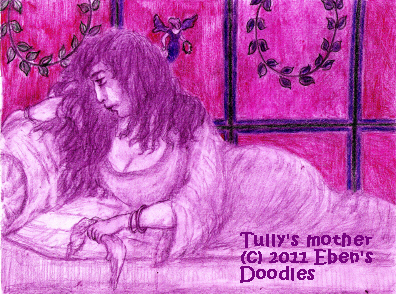
His father sat him down, and then he sat down opposite his son with a small
table between them.
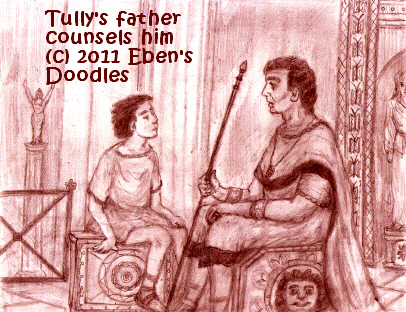
"Son, I have been too busy perhaps to educate you on our family and
its affairs. You are growing up fast, and I need to say something more to you. I have spoken my mind to you concerning the gods, as well as the
god of the Jews who is so singular. Then you should know how our ancestors, how they came
down here to the coast from our original country, Isenia, that lay across the Appenines Mons.
We were strong and numerous, and needed new lands for our growing population. We found and took
this city of the sea-faring Etrurians, people who
had many chariots and lived here before us. Before them were the Greeks and Oscians too, who
worked to build this city on the high rock ridges--though it was a very small one they made, and not at all so beautiful and
strong as ours. It was left to us Samnites to civilize and raise this city up from a mere town with a
river and seaport. We Samnites were the ones who made it flourish with trade and splendid fori
and fine buildings and streets that divide the city into proper squares, and all you see here today is our work and genius. Then the
Romans came with their armies and generals. We accepted their rule, as our interests
were similar. It went well here, until we saw we had no proper representation in the
Senate in Roma. They sent legions attacking us after we went to war with all the other cities of Italia to gain citizenship and an equal
right in the Senate in Roma.
His father cleared his throat, then continued. "Let no one say we do not love
our city. However, things have changed for us. But the chief matter, son, is this, and listen very carefully and
do not forget it.
Tully was growing restless as his father explained the new changes in their prospects,
and when he understood that it could mean a move away from Pompeii, permanently, he
grew alarmed.
"Are we leaving? Please, Pater, I
wouldn't like to leave here. Can't we stay?"
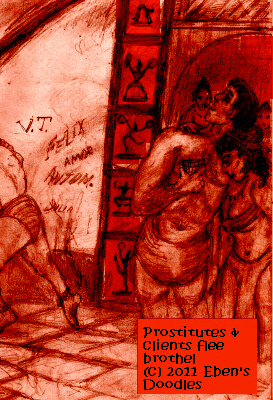
Cassius had never seen them come out together like that before--as it
operated discreetly in certain hired apartments and baths of one of the great houses.
Some of his business friends, as well as certain public officials he
met in his various dealings at the Forum, had offered to take him, but he always declined,
knowing that his wife was an intensely jealous woman, and if she
suspected his dalliance, he would never would hear the end of it!
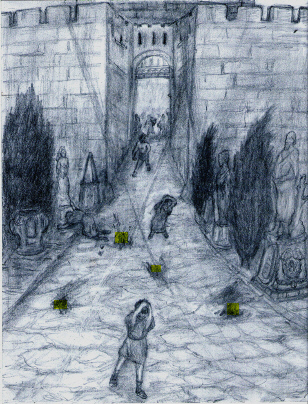
The boiling black and lightning-blazing clouds, after engulfing the
whole city behind him,
almost outraced him, swepping over the
others on the road just behind him. He
fell, then got up, feeling
burns on his legs and arms.
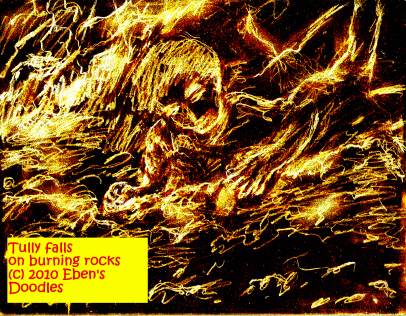
His clothes
smoking in places too, he brushed them
wildly as he ran.
He had just passed through some large, luxurious villas adjoining the road when
the ground shook, along with a tremendous roaring like a thousand bulls
and Tully's heart nearly stopped as his legs buckled.
Whatever it was, he knew he had to keep going or be covered in flying
debris from villas, which tumbled about
like houses of cards as the earth continued shaking.

The quaking stopped, but the rumbling behind him told him the dark, churning
clouds were gaining on him. He left the road, racing down a
lane that led to pastures and the country stables his father
kept for the horses, donkeys and oxen used for their business and household.
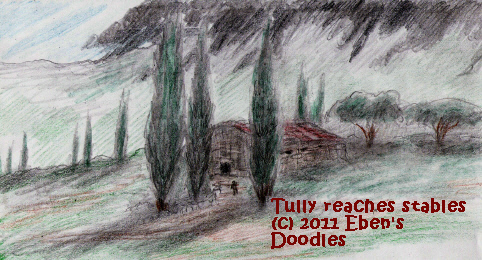
He reached the stables, but found
the servants supposed to watch them had gone, taking
all the horses but one. But how was he to handle him without help? The remaining stallion
was too unmanageable and had been left hobbled. He
had gone wild with fear.
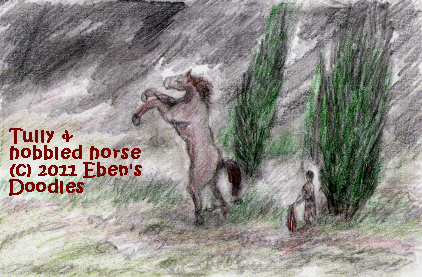
Ero, meanwhile, had gone over the city just before the storms from the
mountain erupted, and thus was able to observe it conducting
its affairs in its last minutes of normal activity. As he proceeded up over the
mountain slopes, Vesuvius came alive, suddenly and catastrophically,
threatening the whole region all around it, not only the cities, ports, and farms and villas,
but all life, human, animal, and plant, as well as the landscape.

Racing back down ahead of the increasingly violent explosions of the
eruption, Ero had passed back over the city and into the country when he
found the mast-bot slowing, as he came to
stables set in big pastures and a lone boy struggling to
get control of a rearing horse.
Ero watched all this, and the mast-bot lowered even more,
and as the boy started off, Ero was moving right ahead of him.
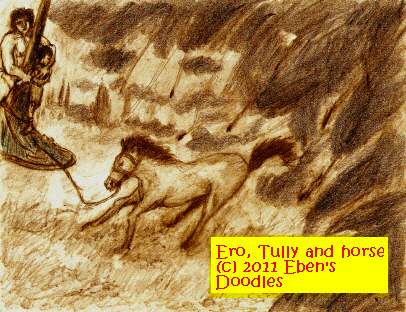
He could see Tully was well aware of him, and yet not afraid to follow him.
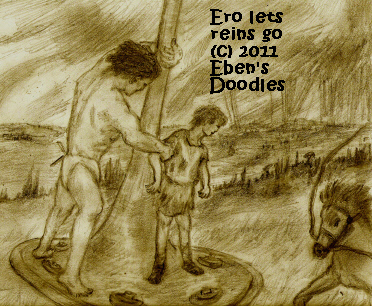
The Pompeiian boy in his hand
saw this happen, and he seemed dazed at first,
accepting this, but then he
grew very perturbed as he saw the
stallion whinnying with fear and falling back further and further,
the clouds gathering round him thicker and thicker.
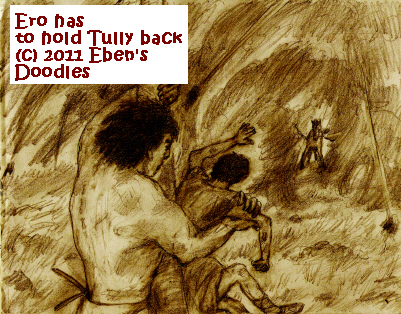
The mast-bot reached Salernum, which was like other
cities in the south jammed with
refugees, as it seemed as if it was not going to suffer the same
fate as the other cities round Vesuvius were suffering.
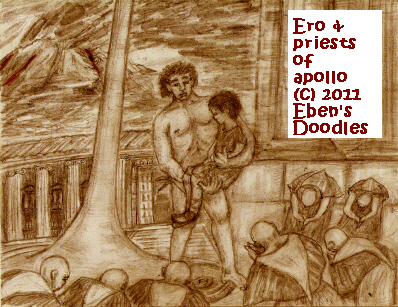
Bowing, the priests treated him
as they would Apollo himself, whom
they believed him to be.
How different was his life in Roma, after leaving the custody of the priests of Temple of Apollo and moving from Salernum with
his guardians, the Nathan bar-Shlomos! At first rumors came that nobody from Stabiae had
escaped alive, but then refugees came flooding into Salernum, taking every available room in the inns and
also the houses of whoever had spare rooms. The rest jammed into the Forum and the
modest stadem to camp out until they found means to go plead for assistance from
the emperor in Roma should he not come down to see their plight with his own eyes.

Five years in the metropolis and world capital of Roma, where all roads led to the Golden
Milestone set up in the Forum Romanorum, had passed so quickly since his reunion with
Aaron and his father together with their family, and now he was sixteen,
a grown man! His father's patrimony, the part returned to him
by the Imperial Treasury, had made him very wealthy, indeed. At his age he
could manage his affairs, with trained men skilled in
bookkeeping and estate management at his side of course. He had his own house,
really a palace Crassus, a famed triumvir with Antonius and Octavianus, had built
on the Palatine Hill,
but being a Samnite with far less a taste for luxury and arrogant display, he preferred to reside with the bar-Shlomos in their more modest
house near a forum and a warehouse district on the Tiberus.
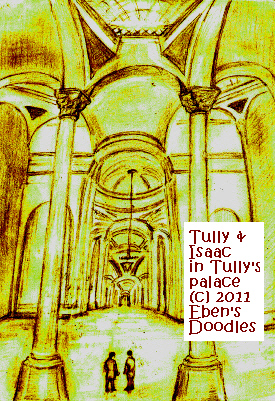
One day everything changed once again for Tully. Only it was not
just remarkable change, it was extraordinary what was proposed to him!
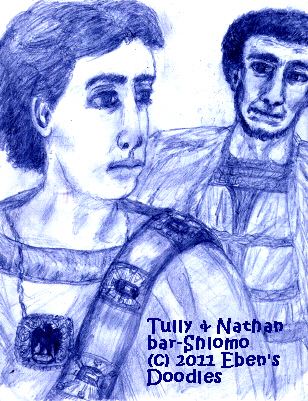
"My people would be forever indebted to you, dear Tullius! Even if we should fail,
they will feel just the same toward us--we will be their heroes forever. But heroism bears a stiff price. Know it is a very dangerous thing, and we could very well lose everything, even our lives if caught, so will you think hard on it first, friend of Israel? Will you count the cost, and only then let me know your decision?"
Later that night, as he lay in bed, the "friend of Israel's" mind whirled with
Nathan bar-Shlomo's sobering words.

The plan was well though out. Nathan had spent many hours and even years on it, ever since the Jewish temple's giant gold candlestick, called the Menorah, had been brought to Roma by Titus
and paraded as a chief item of the war spoil before the
cheering and celebrating crowds packing the triumphal route of Titus and his victorious
troops.
"How may I help, sir? I really want to help you and your people."
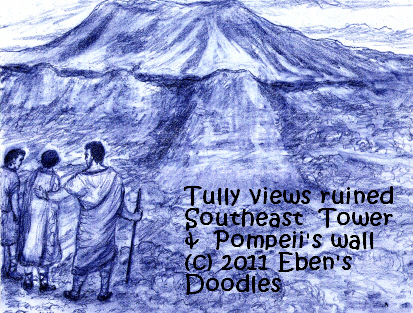
Isaac too was shaken by the desolate scene, and
the three of them just stood there, silently, for a time.
The carruca stopped, they were at the
spot Nathan had chosen, and they got out. Nathan issued orders to
the six men he had brought to do the digging, then
he first sent out his own sentries to go and station themselves
in the ruins beyond the Tower, who were to blow a horn and
warn them if they saw any guard approaching. Everyone was to
drop work immediately, and Nathan would go and speak to the guard
and handle him, bribing him if necessary, while the others kept out of sight.
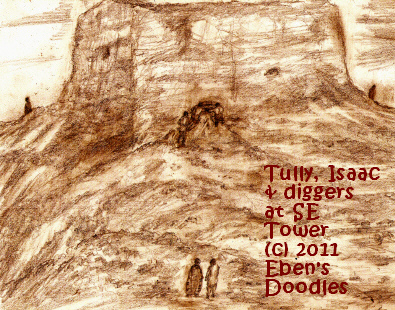
It was a tense situation for
all. Tully and Isaac had already been
instructed. Nathan went to the command post to
check on the guards, but while he was gone Isaac and Tully
were on their own. Some clever excuse would have to be made
why they were in the area, of course, if some guard
happened to find them there. Or if that failed,
a bribe must be given. Since the guard would know nothing about the Menorah,
they needn't make the bribe too high, or he would grow suspicious
and perhaps report them to his sergeant back at their
command post. Then they might have a lot of difficulty!
When Nathan arrived at the Southeast Tower,
he relieved Tully and Isaac to take some men and go search for
Tully's parents' remains.
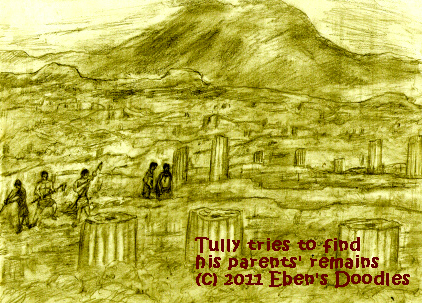
It was very hard going.
The mud and ash were mixed and solid, nearly petrified in the five years
since the city had been covered up. They dug with their adzes,
and made slow progress. The first hole got them nothing when they reached the
floor of the chamber. His mother's couch bed was found, but no one was in it.
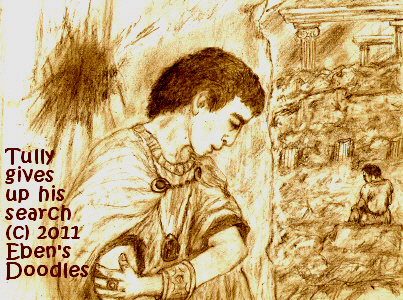
While Tully was mourning the loss of his parents and suffering defeat, events were taking place that
Ero was well aware of, that could change everything for Tully and his guardian, in a bad way.

But as the sailors fought their vessels from
swamping and foundering to keep, black clouds of poison gas and ashfall
descended, engulfing the ships. They were all plunged into darkest night.
In seconds, hundreds of sailors and the
galley crews were gasping, doubling up and dying.

He reached the land and continued ferrying
others to safety until midnight--whoever, that is, who dared to take a ride with a
godlike being and climb aboard with him! Most people refused and even ran from him despite his pleas he wanted to help them.
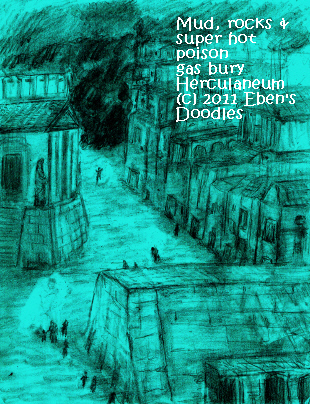
He was able to reach the port's boat sheds, massive cement vaults set along the sea wall that
were sheltering refugees just before the pyroclastic mudflow swept over it.
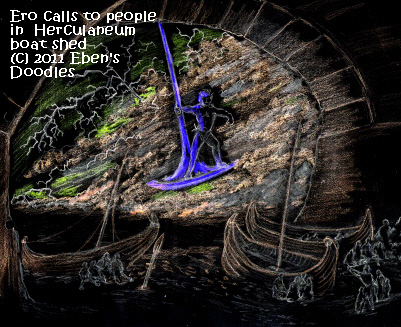
Astonished by the sight of him, none would take his offer--thinking him a god who was
playing with them most cruelly--except one family with two small children, they eagerly ran to him
and Ero helped them up. They had no sooner left the port when the mudflow reached the sea wall and
boat sheds, and it was all over with the people there. Five hundred degree temperatures
extinguished all life instantly even though the mud did not completely fill the boat sheds,
just blocking the entrances for the next the next two millennia.
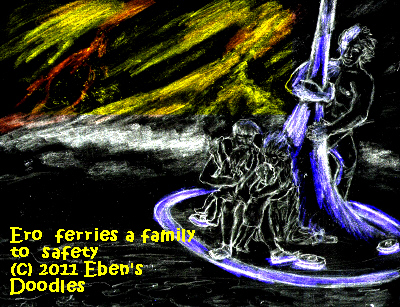
As soon as they reached a safe enough place, nearest Neapolis on the road,
he let the little family disembark, which they were eager to do anyway, god or no god.
Strange things happen in catastrophes, and this was certainly one--a god transporting them to safety!
The grateful woman wanted to give him her pearl and amber bracelets and earrings, but he thanked her
though he couldn't accept them. He knew they had probably lost everything and would need what little
money and jewelry they had left on them. They were both young, he saw, so there was a good chance they could
build a new life in Neapolis.

This encouraged Ero, that he had saved these lives at least. Previously,
he had tried to save people on board some ships, one carrying the Admiral of the Fleet, Plinius the Elder.
Never would he forget what he had seen at Herculaneum and Pompeii. Now, five years later, the mountain lay asleep. But he knew the sleep was deceptive. Someday again no doubt it would suddenly awaken and destroy
just as it had in the past.
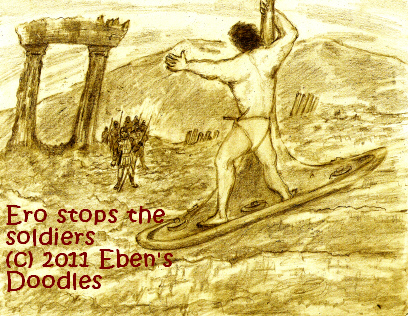
No human enemy on earth could stop Roman soldiers like this without a fierce response. "Hail, the god Mercurius! Hail!"
one cried out. Others fell down worshipping him as Apollo instead, whom he greatly resembled.
The sergeant himself had fallen on his knees, his hands outstretched, pleading for favor, as he had failed to sacrifice to Mars for some time and feared the god had come to punish him.
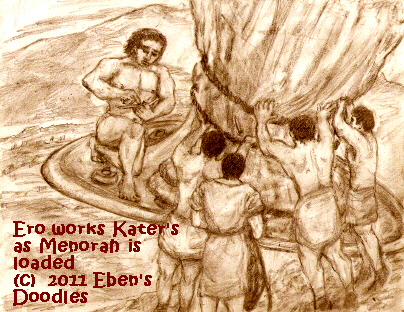
It was just in time for Ero to turn, rise, and
fly to confront the approaching soldiers who were double-timing it to the Tower of Alexander.
The moment they saw him, they stopped so abruptly they piled into each other,
their shields clattering to the ground.
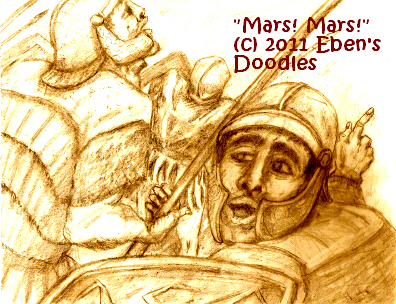
He was Mars, the fearsome god of war and bloodshed,
they thought, whose red star winged overhead and cast doom and destruction on the earth whenever it
came close. And though seasoned men of war themselves, they all had reason to fear a cruel, mighty god who was known to turn on
friend and foe alike, he was so capricious and vengeful of any offense or slight done to him!
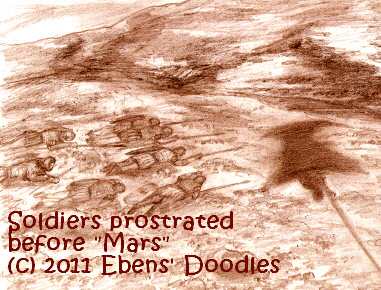
The second group was just as easy to turn to flight, they were so overawed and, convinced he
was Mars, of whom it was said a single angry glance could slay a man. Forgetting their shields and spears, they scrambled to their feet and
sped back toward Misenum, not even stopping in Neapolis, a small, ash-covered town on
the way.
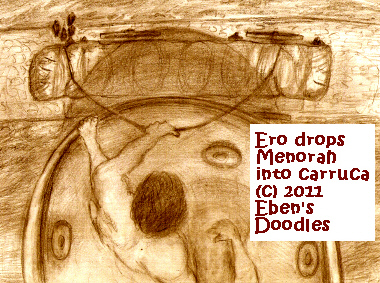
Nathan made sure the walls torn from the carruca would not be discovered, for he had his workmen bury them some distance from the road.
Isaac looked at his father, then hung his head, seeing he was unable to counter his father's arguments.
PLEASE RETURN FOR MORE OF THIS EPISODE WHEN IT COMES ON-LINE SOON

UNCHRONICLE OF CRISPUS AND THE PHOENIX, VOL. IV, RETROSTAR
Crispus was as good as born in the purple (i.e., porphryogenesis) when his father turned out to
be emperor, one of Roma's greatest and noblest. It did not matter so much that his mother Minervina was
not of exalted family and was mere flesh and blood. A provincial woman of commoner blood and status, she was soon forgotten by the rising Constantinus,
if not by her son, after Constantinus left her and took a high born woman, well-connected, from an imperial family for his wife, thus pleasing his mother who favored the re-match.
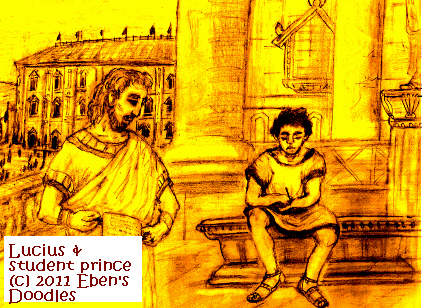
After a particularly good test showing, Lucius could not be more pleased with Cripus and his progress. Trevorum, a large and sophisticated city with many temptations for boys and men,
the elegant capital of the prefecture of Belgica, wasn't
proving to be the distraction he first feared. The royal court and palaces with all their pomp, entertainments, and
lavish ceremonies, was distraction enough, but
a boy couldn't be kept within the royal palace's confines forever--he was bound to venture out and seek
amusements in the city streets, the baths, the theaters, and the amphitheater, which
showed all sorts of bloody contests, sports and games--even though the worst excesses had been
banned. Then there were the bawdy tavernas with their drinking and dancing and
prostitutes and whores, and the gambling houses set with lewd phalluses of Priapus to catch the attention of the youth.
Lucius set down his book, and, reluctant to find out what
the cause was, intended to call the studies
done for the day when Crispus rushed over to him and
knelt before him. "I have sinned greviously, sir!"
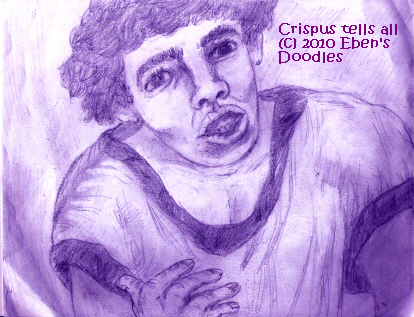
The more Crispus told him, the worse it got, and then it was
utter misery to hear the details. Finally, he had to stop his ears with his clenched hands! It was such a torrent
of filth flowing out of this mere boy it was driving him mad!
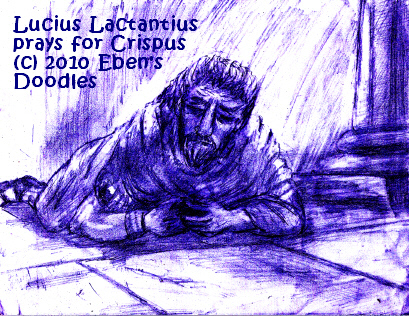
The moment he entered through the great double bronze doors of the basilica church, he
knew it was the perfect choice of refuge for him in his state. He continued on through the
great sanctuary, seeing few at that hour in the edifice. He found a chapel where there was
no one, and no one even close to it. What a relief! He could be utterly alone
with his trouble and misery.
Going in he passed behind the pillars and fell on his knees and then on his face. With groans, he cried onto the Lord God
for Crispus. His own agony was so great he felt like his heart might stop,
he was so pained.
He addressed the woman, Hostia, suspecting she was
the most guilty party.
It so happened that while the trial was proceeding, Crispus
wandered around the palace, looking for something to do, and went into a room where new mosaics had just been finished
by the artisans. Stepping over piles of various colored cubes of stone and
pots of half-hardened plaster, Crispus's went to one mosaic that caught his eye first.

The following days, after the two women in the secretly handled
case were dealt with by the authorities (Hostia was strangled, and Monica, because she
truly repented and showed no defiance, was sent to a cloister), things returned to normal in the relations of teacher and student,
or so it seemed on the surface.
One day, just as he was determined to return home to write to the emperor about his son's
greatly
changed temperament, an officer of the palace guard stepped over to him, blocking his way. He saluted
Lucius, but Lucius could see something serious was about to involve his entire life in the officer's
manner.
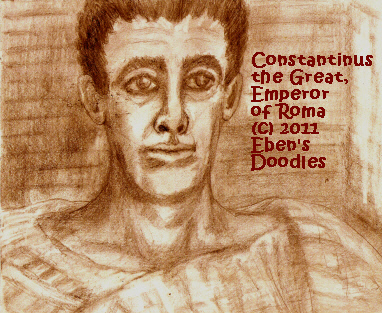
PLEASE RETURN FOR MORE OF THIS EPISODE.

Ero and the Paul Revere Field Study
Ero and "Paul Revere Field Study," Vol. IV, Retrostar


UNCHRONICLE OF THE TITANS OF LAKE CONSTANCE
Titans in deep water storage? The unexpected discovery electrified the world
and news centered on it for many weeks as discovery was soon followed by exploratory
visits and assessment by teams of experts.
Three colossal figures in stone had been discovered 252 meters down on the lake bottom, where the
glacial water was coldest and darkest. At such a depth, in those extreme, inhospitable conditions,
they had eluded detection for thousands of years.
It took several years for teams of scientists and preservationists to devise a working plan to
retrieve them for eventually setting up in a structure that had held the floating Zepellin hangar.
Many people thought they should be left in situ, not disturbed, but
how many people could see them that way?--very few indeed could go down in
submersibles and bathyspheres to reach it, which restricted visitation to strictly scientists. So a museum was
made ready where the public could come and take in the awesome sight.
Information was also going to be made available, showing the ancient
landscape as it had once been, and how the lake bottom had once stretched for hundreds of miles
as a grassy, savanna-type plain on a gigantic mother continent, long before the relatively modern eras
continental drift and rapid mountain building that
created the Alpes and other mountain chains across the globe. There was even
some evidence that the monoliths had even been brought in, not carved from
a rock formation on its present foundation, which was formed of an entirely
different stone than the bluish (not normally greenish) serpentine of the figures.

Cut away by robotics with diamond-tipped drills and its immense shell filled with innumerable flotation
chips, slowly, the first titan was cabled to the surface of Lake Constance--
and the first who reached it called to the many others waiting along the shores to
come and see for themselves. The flotation chips were gradually
extracted and the interior of the titan was refilled with a hard but light
composite that bonded to the shell and made a solid within the shell strong enough
for the titan to be moved to shore without danger of it cracking or breaking apart.
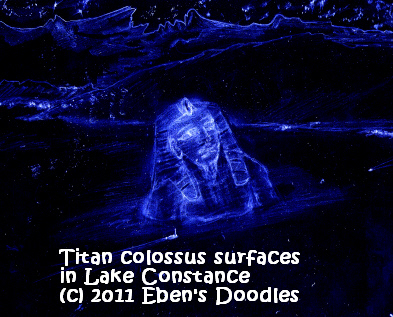
Two of the Titans were humanoid in appearance, but one in the center of the triad was not, resembling an Ancient Egyptian
zoomorphic raptor, such a
an eagle or Horus-hawk at the head and neck, while the bird part was joined seamlessly to
a human-like body. Many people thought it was horrible, to mix human and animal, but somehow
the creators of this raptor-humanoid had contrived a noble looking being,
kingly and commanding in presence.
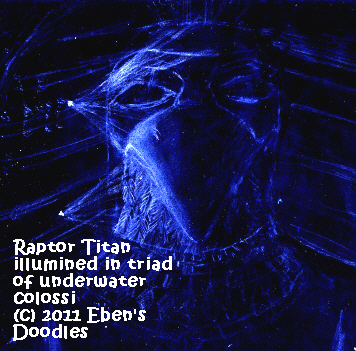
The discovery of the colossi seemed fortuitous to some. This great glacial-melt lake in the mountains bordering Germany, Switzerland, and Austria happened to be the very site of the floating hangars that birthed the first Zeppelins, those
giant rigid airships created by their ingenious namesake, Count Ferdinand von Zeppelin, who himself was born in Constance (Konstanz). What marvels
they were at the time, unleashing unparalleled destruction upon the greatest, proudest cities. Waves of them
were sent across the English channel in World War I and carried men and munitions to
strike terror in the hearts of Londoners who before this had thought airships or air travel
rather amusing playthings. Londoners had good reason to think that Civilisation was
coming to an end as they gazed
helplessly up into the sky while these vast, grey, sinister cigar-shapes
reined down death and destruction. There came a respite with the Defeat of the
Central Powers of Germany and Austo-Hungary, but later the Zeppelins returned with Hitler's bid to
reclaim the world's airspace for German glory.

RETROSTAR TIMELINES

Retrostar Directory and Linking Page
Concluding Parts of Unchronicle of the Heavenly Rune-Book," Vol. IV, Retrostar:
Conclusion of Unchronicle of the Heavenly Rune-Book
Listing and Links for All Chronicles in Directory II:
Retrostar Chronicles, Directory II
Oaringintheriver Home Page
Part IV of the Unchronicle of the Last Ship to Massilia:
Part IV, The Road to Jerusalem, Unchronicle of the Last Ship to Massilia, Vol. IV, Retrostar